Managing Service Quality for Park Avenue Hotel
VerifiedAdded on 2023/01/07
|16
|5745
|76
AI Summary
This document discusses the critical evaluation of main theories and principles of managing service quality, the importance of measuring service quality, and the impact of existing service delivery practices on staff motivation and engagement at Park Avenue Hotel.
Contribute Materials
Your contribution can guide someone’s learning journey. Share your
documents today.
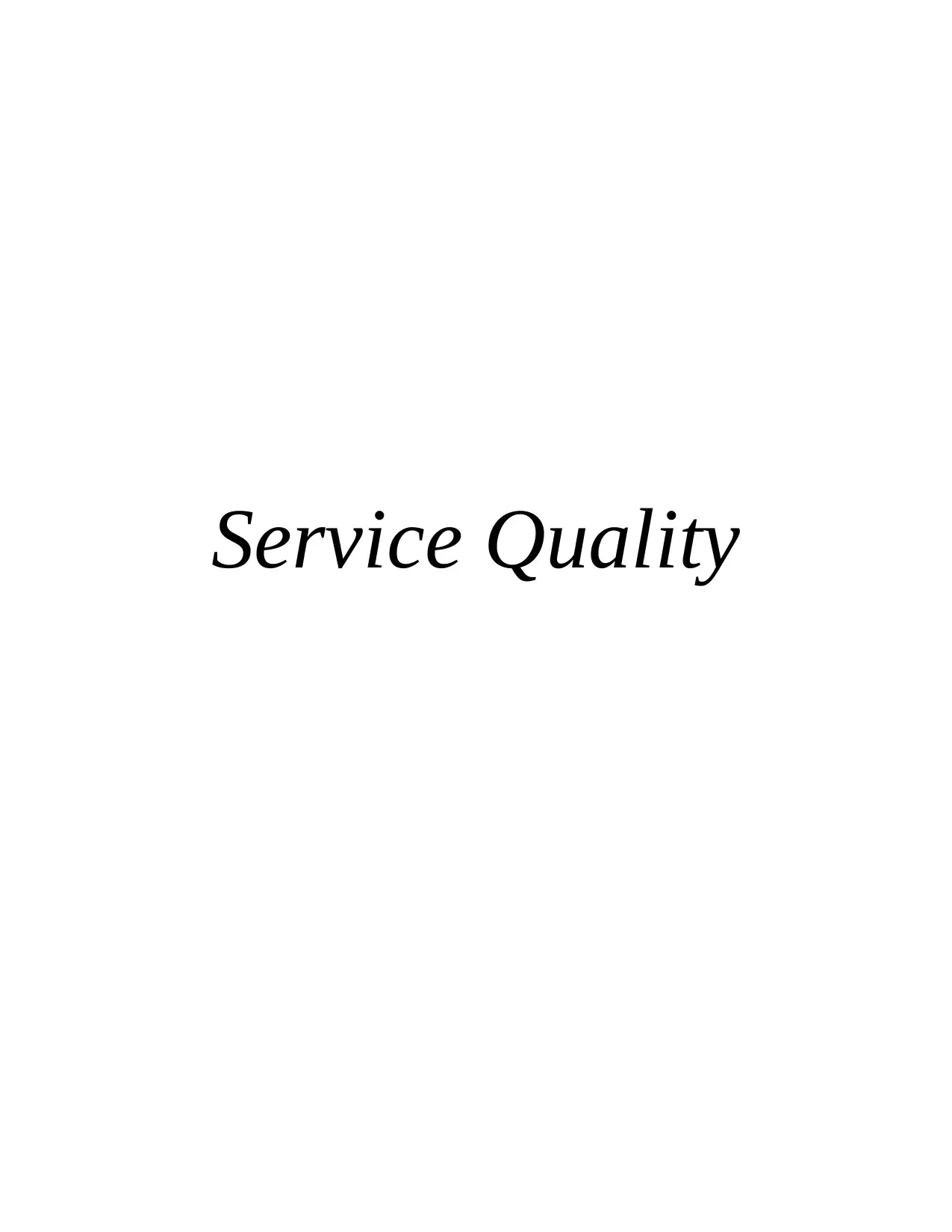
Service Quality
Secure Best Marks with AI Grader
Need help grading? Try our AI Grader for instant feedback on your assignments.
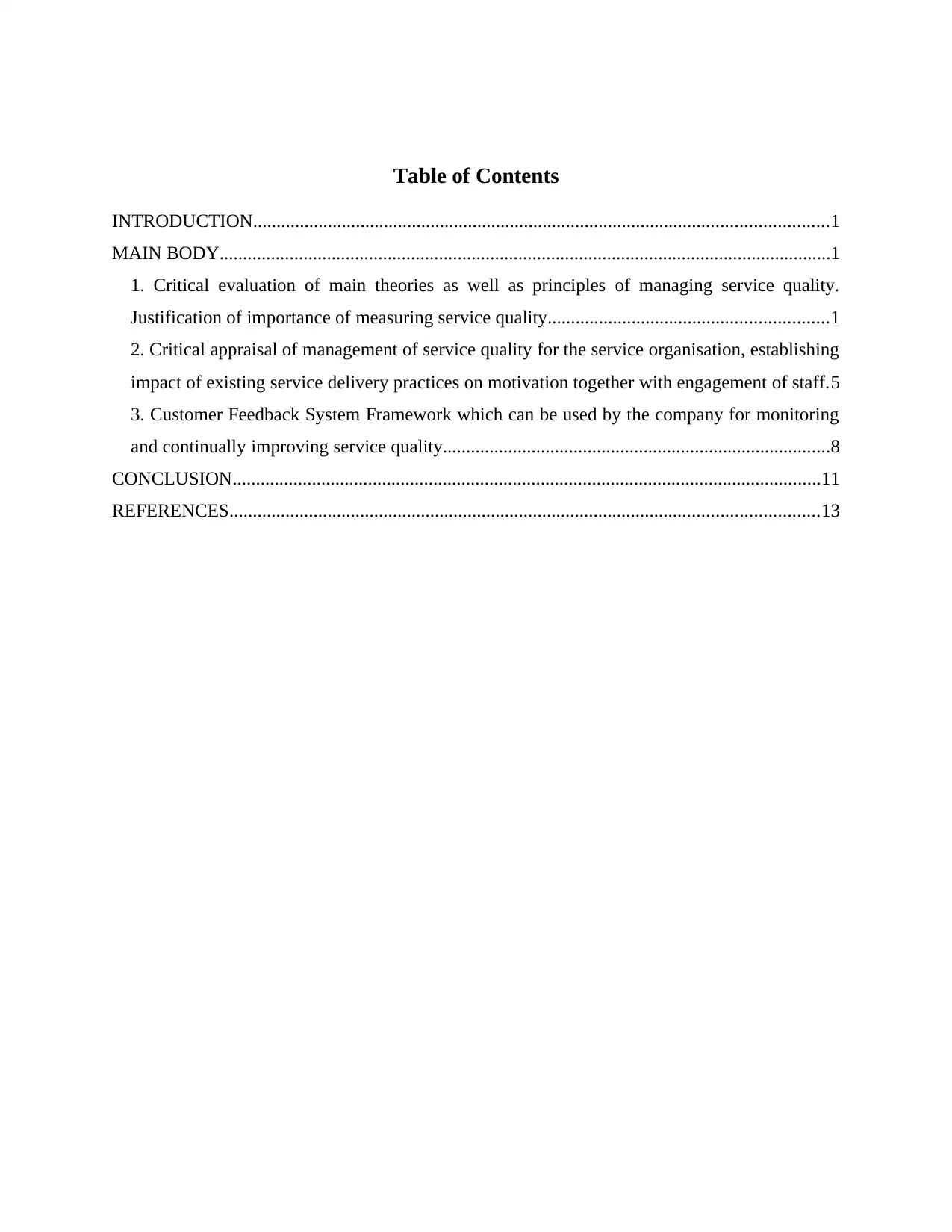
Table of Contents
INTRODUCTION...........................................................................................................................1
MAIN BODY...................................................................................................................................1
1. Critical evaluation of main theories as well as principles of managing service quality.
Justification of importance of measuring service quality............................................................1
2. Critical appraisal of management of service quality for the service organisation, establishing
impact of existing service delivery practices on motivation together with engagement of staff.5
3. Customer Feedback System Framework which can be used by the company for monitoring
and continually improving service quality...................................................................................8
CONCLUSION..............................................................................................................................11
REFERENCES..............................................................................................................................13
INTRODUCTION...........................................................................................................................1
MAIN BODY...................................................................................................................................1
1. Critical evaluation of main theories as well as principles of managing service quality.
Justification of importance of measuring service quality............................................................1
2. Critical appraisal of management of service quality for the service organisation, establishing
impact of existing service delivery practices on motivation together with engagement of staff.5
3. Customer Feedback System Framework which can be used by the company for monitoring
and continually improving service quality...................................................................................8
CONCLUSION..............................................................................................................................11
REFERENCES..............................................................................................................................13
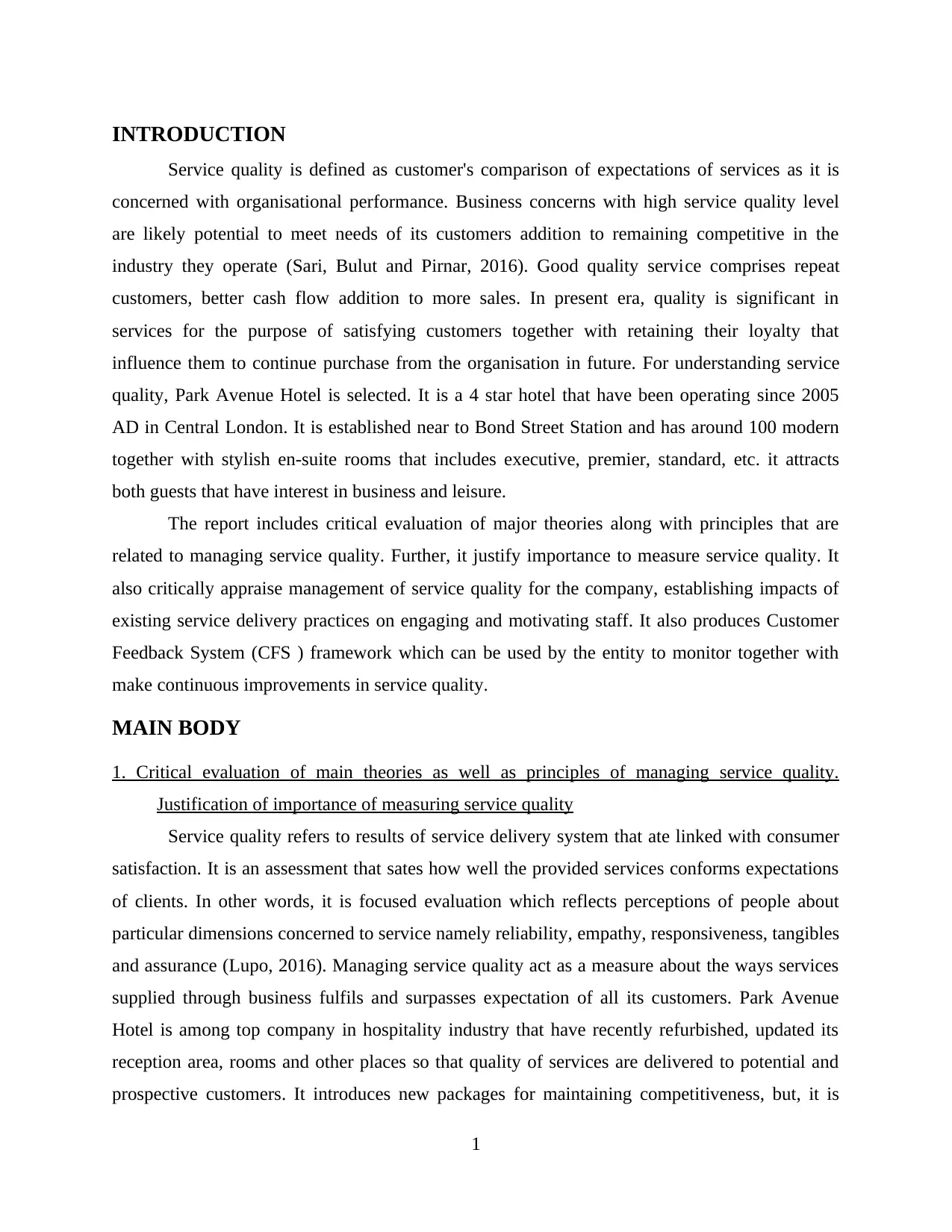
INTRODUCTION
Service quality is defined as customer's comparison of expectations of services as it is
concerned with organisational performance. Business concerns with high service quality level
are likely potential to meet needs of its customers addition to remaining competitive in the
industry they operate (Sari, Bulut and Pirnar, 2016). Good quality service comprises repeat
customers, better cash flow addition to more sales. In present era, quality is significant in
services for the purpose of satisfying customers together with retaining their loyalty that
influence them to continue purchase from the organisation in future. For understanding service
quality, Park Avenue Hotel is selected. It is a 4 star hotel that have been operating since 2005
AD in Central London. It is established near to Bond Street Station and has around 100 modern
together with stylish en-suite rooms that includes executive, premier, standard, etc. it attracts
both guests that have interest in business and leisure.
The report includes critical evaluation of major theories along with principles that are
related to managing service quality. Further, it justify importance to measure service quality. It
also critically appraise management of service quality for the company, establishing impacts of
existing service delivery practices on engaging and motivating staff. It also produces Customer
Feedback System (CFS ) framework which can be used by the entity to monitor together with
make continuous improvements in service quality.
MAIN BODY
1. Critical evaluation of main theories as well as principles of managing service quality.
Justification of importance of measuring service quality
Service quality refers to results of service delivery system that ate linked with consumer
satisfaction. It is an assessment that sates how well the provided services conforms expectations
of clients. In other words, it is focused evaluation which reflects perceptions of people about
particular dimensions concerned to service namely reliability, empathy, responsiveness, tangibles
and assurance (Lupo, 2016). Managing service quality act as a measure about the ways services
supplied through business fulfils and surpasses expectation of all its customers. Park Avenue
Hotel is among top company in hospitality industry that have recently refurbished, updated its
reception area, rooms and other places so that quality of services are delivered to potential and
prospective customers. It introduces new packages for maintaining competitiveness, but, it is
1
Service quality is defined as customer's comparison of expectations of services as it is
concerned with organisational performance. Business concerns with high service quality level
are likely potential to meet needs of its customers addition to remaining competitive in the
industry they operate (Sari, Bulut and Pirnar, 2016). Good quality service comprises repeat
customers, better cash flow addition to more sales. In present era, quality is significant in
services for the purpose of satisfying customers together with retaining their loyalty that
influence them to continue purchase from the organisation in future. For understanding service
quality, Park Avenue Hotel is selected. It is a 4 star hotel that have been operating since 2005
AD in Central London. It is established near to Bond Street Station and has around 100 modern
together with stylish en-suite rooms that includes executive, premier, standard, etc. it attracts
both guests that have interest in business and leisure.
The report includes critical evaluation of major theories along with principles that are
related to managing service quality. Further, it justify importance to measure service quality. It
also critically appraise management of service quality for the company, establishing impacts of
existing service delivery practices on engaging and motivating staff. It also produces Customer
Feedback System (CFS ) framework which can be used by the entity to monitor together with
make continuous improvements in service quality.
MAIN BODY
1. Critical evaluation of main theories as well as principles of managing service quality.
Justification of importance of measuring service quality
Service quality refers to results of service delivery system that ate linked with consumer
satisfaction. It is an assessment that sates how well the provided services conforms expectations
of clients. In other words, it is focused evaluation which reflects perceptions of people about
particular dimensions concerned to service namely reliability, empathy, responsiveness, tangibles
and assurance (Lupo, 2016). Managing service quality act as a measure about the ways services
supplied through business fulfils and surpasses expectation of all its customers. Park Avenue
Hotel is among top company in hospitality industry that have recently refurbished, updated its
reception area, rooms and other places so that quality of services are delivered to potential and
prospective customers. It introduces new packages for maintaining competitiveness, but, it is
1
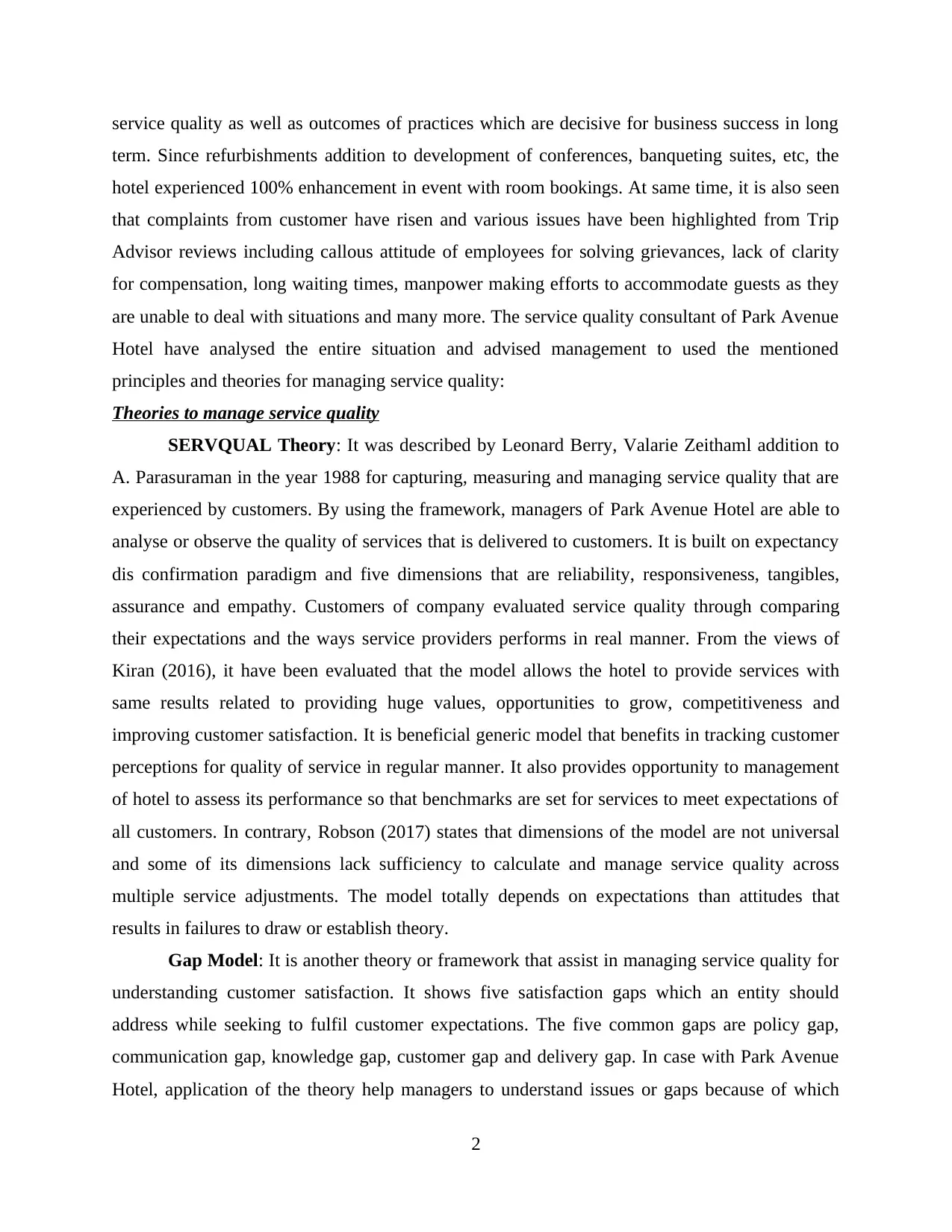
service quality as well as outcomes of practices which are decisive for business success in long
term. Since refurbishments addition to development of conferences, banqueting suites, etc, the
hotel experienced 100% enhancement in event with room bookings. At same time, it is also seen
that complaints from customer have risen and various issues have been highlighted from Trip
Advisor reviews including callous attitude of employees for solving grievances, lack of clarity
for compensation, long waiting times, manpower making efforts to accommodate guests as they
are unable to deal with situations and many more. The service quality consultant of Park Avenue
Hotel have analysed the entire situation and advised management to used the mentioned
principles and theories for managing service quality:
Theories to manage service quality
SERVQUAL Theory: It was described by Leonard Berry, Valarie Zeithaml addition to
A. Parasuraman in the year 1988 for capturing, measuring and managing service quality that are
experienced by customers. By using the framework, managers of Park Avenue Hotel are able to
analyse or observe the quality of services that is delivered to customers. It is built on expectancy
dis confirmation paradigm and five dimensions that are reliability, responsiveness, tangibles,
assurance and empathy. Customers of company evaluated service quality through comparing
their expectations and the ways service providers performs in real manner. From the views of
Kiran (2016), it have been evaluated that the model allows the hotel to provide services with
same results related to providing huge values, opportunities to grow, competitiveness and
improving customer satisfaction. It is beneficial generic model that benefits in tracking customer
perceptions for quality of service in regular manner. It also provides opportunity to management
of hotel to assess its performance so that benchmarks are set for services to meet expectations of
all customers. In contrary, Robson (2017) states that dimensions of the model are not universal
and some of its dimensions lack sufficiency to calculate and manage service quality across
multiple service adjustments. The model totally depends on expectations than attitudes that
results in failures to draw or establish theory.
Gap Model: It is another theory or framework that assist in managing service quality for
understanding customer satisfaction. It shows five satisfaction gaps which an entity should
address while seeking to fulfil customer expectations. The five common gaps are policy gap,
communication gap, knowledge gap, customer gap and delivery gap. In case with Park Avenue
Hotel, application of the theory help managers to understand issues or gaps because of which
2
term. Since refurbishments addition to development of conferences, banqueting suites, etc, the
hotel experienced 100% enhancement in event with room bookings. At same time, it is also seen
that complaints from customer have risen and various issues have been highlighted from Trip
Advisor reviews including callous attitude of employees for solving grievances, lack of clarity
for compensation, long waiting times, manpower making efforts to accommodate guests as they
are unable to deal with situations and many more. The service quality consultant of Park Avenue
Hotel have analysed the entire situation and advised management to used the mentioned
principles and theories for managing service quality:
Theories to manage service quality
SERVQUAL Theory: It was described by Leonard Berry, Valarie Zeithaml addition to
A. Parasuraman in the year 1988 for capturing, measuring and managing service quality that are
experienced by customers. By using the framework, managers of Park Avenue Hotel are able to
analyse or observe the quality of services that is delivered to customers. It is built on expectancy
dis confirmation paradigm and five dimensions that are reliability, responsiveness, tangibles,
assurance and empathy. Customers of company evaluated service quality through comparing
their expectations and the ways service providers performs in real manner. From the views of
Kiran (2016), it have been evaluated that the model allows the hotel to provide services with
same results related to providing huge values, opportunities to grow, competitiveness and
improving customer satisfaction. It is beneficial generic model that benefits in tracking customer
perceptions for quality of service in regular manner. It also provides opportunity to management
of hotel to assess its performance so that benchmarks are set for services to meet expectations of
all customers. In contrary, Robson (2017) states that dimensions of the model are not universal
and some of its dimensions lack sufficiency to calculate and manage service quality across
multiple service adjustments. The model totally depends on expectations than attitudes that
results in failures to draw or establish theory.
Gap Model: It is another theory or framework that assist in managing service quality for
understanding customer satisfaction. It shows five satisfaction gaps which an entity should
address while seeking to fulfil customer expectations. The five common gaps are policy gap,
communication gap, knowledge gap, customer gap and delivery gap. In case with Park Avenue
Hotel, application of the theory help managers to understand issues or gaps because of which
2
Secure Best Marks with AI Grader
Need help grading? Try our AI Grader for instant feedback on your assignments.
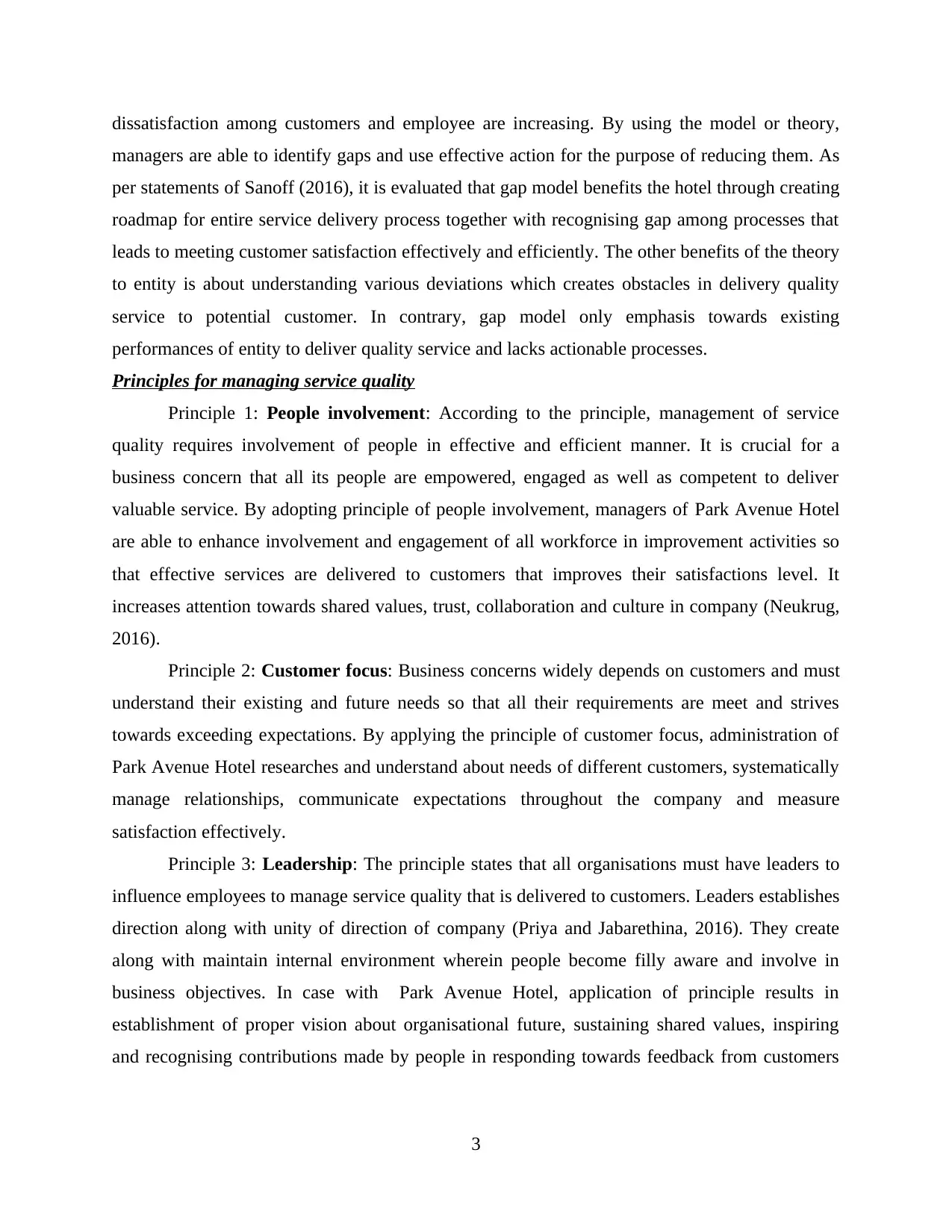
dissatisfaction among customers and employee are increasing. By using the model or theory,
managers are able to identify gaps and use effective action for the purpose of reducing them. As
per statements of Sanoff (2016), it is evaluated that gap model benefits the hotel through creating
roadmap for entire service delivery process together with recognising gap among processes that
leads to meeting customer satisfaction effectively and efficiently. The other benefits of the theory
to entity is about understanding various deviations which creates obstacles in delivery quality
service to potential customer. In contrary, gap model only emphasis towards existing
performances of entity to deliver quality service and lacks actionable processes.
Principles for managing service quality
Principle 1: People involvement: According to the principle, management of service
quality requires involvement of people in effective and efficient manner. It is crucial for a
business concern that all its people are empowered, engaged as well as competent to deliver
valuable service. By adopting principle of people involvement, managers of Park Avenue Hotel
are able to enhance involvement and engagement of all workforce in improvement activities so
that effective services are delivered to customers that improves their satisfactions level. It
increases attention towards shared values, trust, collaboration and culture in company (Neukrug,
2016).
Principle 2: Customer focus: Business concerns widely depends on customers and must
understand their existing and future needs so that all their requirements are meet and strives
towards exceeding expectations. By applying the principle of customer focus, administration of
Park Avenue Hotel researches and understand about needs of different customers, systematically
manage relationships, communicate expectations throughout the company and measure
satisfaction effectively.
Principle 3: Leadership: The principle states that all organisations must have leaders to
influence employees to manage service quality that is delivered to customers. Leaders establishes
direction along with unity of direction of company (Priya and Jabarethina, 2016). They create
along with maintain internal environment wherein people become filly aware and involve in
business objectives. In case with Park Avenue Hotel, application of principle results in
establishment of proper vision about organisational future, sustaining shared values, inspiring
and recognising contributions made by people in responding towards feedback from customers
3
managers are able to identify gaps and use effective action for the purpose of reducing them. As
per statements of Sanoff (2016), it is evaluated that gap model benefits the hotel through creating
roadmap for entire service delivery process together with recognising gap among processes that
leads to meeting customer satisfaction effectively and efficiently. The other benefits of the theory
to entity is about understanding various deviations which creates obstacles in delivery quality
service to potential customer. In contrary, gap model only emphasis towards existing
performances of entity to deliver quality service and lacks actionable processes.
Principles for managing service quality
Principle 1: People involvement: According to the principle, management of service
quality requires involvement of people in effective and efficient manner. It is crucial for a
business concern that all its people are empowered, engaged as well as competent to deliver
valuable service. By adopting principle of people involvement, managers of Park Avenue Hotel
are able to enhance involvement and engagement of all workforce in improvement activities so
that effective services are delivered to customers that improves their satisfactions level. It
increases attention towards shared values, trust, collaboration and culture in company (Neukrug,
2016).
Principle 2: Customer focus: Business concerns widely depends on customers and must
understand their existing and future needs so that all their requirements are meet and strives
towards exceeding expectations. By applying the principle of customer focus, administration of
Park Avenue Hotel researches and understand about needs of different customers, systematically
manage relationships, communicate expectations throughout the company and measure
satisfaction effectively.
Principle 3: Leadership: The principle states that all organisations must have leaders to
influence employees to manage service quality that is delivered to customers. Leaders establishes
direction along with unity of direction of company (Priya and Jabarethina, 2016). They create
along with maintain internal environment wherein people become filly aware and involve in
business objectives. In case with Park Avenue Hotel, application of principle results in
establishment of proper vision about organisational future, sustaining shared values, inspiring
and recognising contributions made by people in responding towards feedback from customers
3
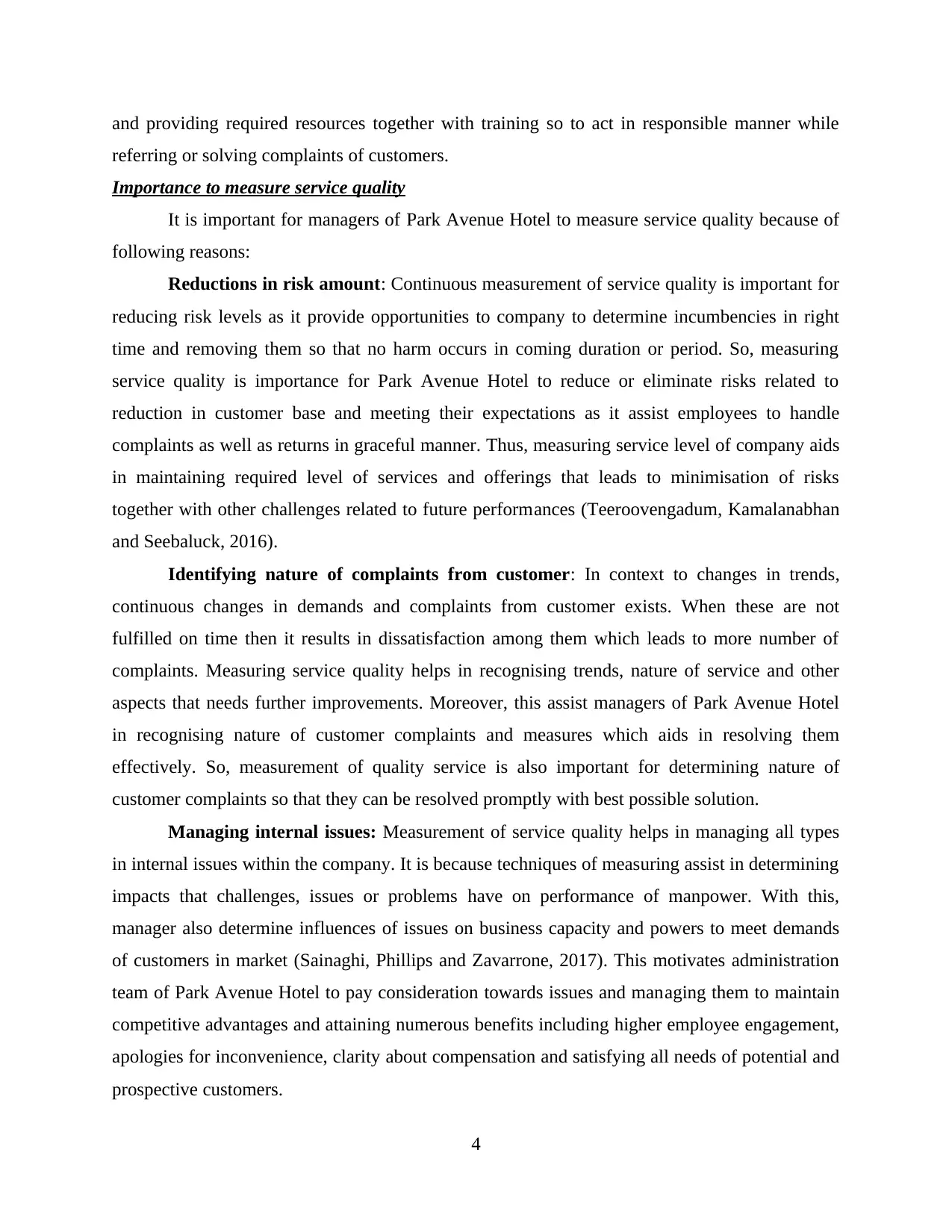
and providing required resources together with training so to act in responsible manner while
referring or solving complaints of customers.
Importance to measure service quality
It is important for managers of Park Avenue Hotel to measure service quality because of
following reasons:
Reductions in risk amount: Continuous measurement of service quality is important for
reducing risk levels as it provide opportunities to company to determine incumbencies in right
time and removing them so that no harm occurs in coming duration or period. So, measuring
service quality is importance for Park Avenue Hotel to reduce or eliminate risks related to
reduction in customer base and meeting their expectations as it assist employees to handle
complaints as well as returns in graceful manner. Thus, measuring service level of company aids
in maintaining required level of services and offerings that leads to minimisation of risks
together with other challenges related to future performances (Teeroovengadum, Kamalanabhan
and Seebaluck, 2016).
Identifying nature of complaints from customer: In context to changes in trends,
continuous changes in demands and complaints from customer exists. When these are not
fulfilled on time then it results in dissatisfaction among them which leads to more number of
complaints. Measuring service quality helps in recognising trends, nature of service and other
aspects that needs further improvements. Moreover, this assist managers of Park Avenue Hotel
in recognising nature of customer complaints and measures which aids in resolving them
effectively. So, measurement of quality service is also important for determining nature of
customer complaints so that they can be resolved promptly with best possible solution.
Managing internal issues: Measurement of service quality helps in managing all types
in internal issues within the company. It is because techniques of measuring assist in determining
impacts that challenges, issues or problems have on performance of manpower. With this,
manager also determine influences of issues on business capacity and powers to meet demands
of customers in market (Sainaghi, Phillips and Zavarrone, 2017). This motivates administration
team of Park Avenue Hotel to pay consideration towards issues and managing them to maintain
competitive advantages and attaining numerous benefits including higher employee engagement,
apologies for inconvenience, clarity about compensation and satisfying all needs of potential and
prospective customers.
4
referring or solving complaints of customers.
Importance to measure service quality
It is important for managers of Park Avenue Hotel to measure service quality because of
following reasons:
Reductions in risk amount: Continuous measurement of service quality is important for
reducing risk levels as it provide opportunities to company to determine incumbencies in right
time and removing them so that no harm occurs in coming duration or period. So, measuring
service quality is importance for Park Avenue Hotel to reduce or eliminate risks related to
reduction in customer base and meeting their expectations as it assist employees to handle
complaints as well as returns in graceful manner. Thus, measuring service level of company aids
in maintaining required level of services and offerings that leads to minimisation of risks
together with other challenges related to future performances (Teeroovengadum, Kamalanabhan
and Seebaluck, 2016).
Identifying nature of complaints from customer: In context to changes in trends,
continuous changes in demands and complaints from customer exists. When these are not
fulfilled on time then it results in dissatisfaction among them which leads to more number of
complaints. Measuring service quality helps in recognising trends, nature of service and other
aspects that needs further improvements. Moreover, this assist managers of Park Avenue Hotel
in recognising nature of customer complaints and measures which aids in resolving them
effectively. So, measurement of quality service is also important for determining nature of
customer complaints so that they can be resolved promptly with best possible solution.
Managing internal issues: Measurement of service quality helps in managing all types
in internal issues within the company. It is because techniques of measuring assist in determining
impacts that challenges, issues or problems have on performance of manpower. With this,
manager also determine influences of issues on business capacity and powers to meet demands
of customers in market (Sainaghi, Phillips and Zavarrone, 2017). This motivates administration
team of Park Avenue Hotel to pay consideration towards issues and managing them to maintain
competitive advantages and attaining numerous benefits including higher employee engagement,
apologies for inconvenience, clarity about compensation and satisfying all needs of potential and
prospective customers.
4
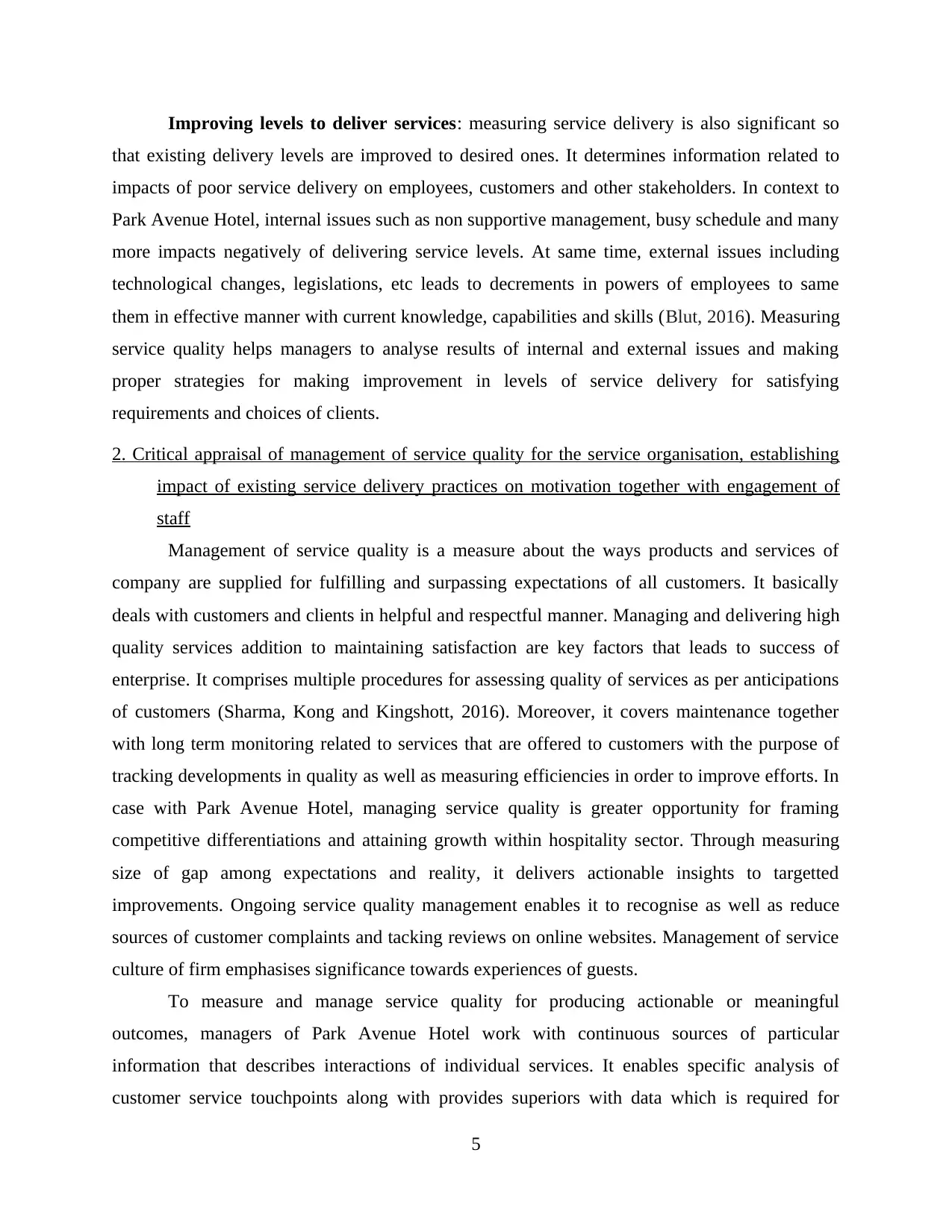
Improving levels to deliver services: measuring service delivery is also significant so
that existing delivery levels are improved to desired ones. It determines information related to
impacts of poor service delivery on employees, customers and other stakeholders. In context to
Park Avenue Hotel, internal issues such as non supportive management, busy schedule and many
more impacts negatively of delivering service levels. At same time, external issues including
technological changes, legislations, etc leads to decrements in powers of employees to same
them in effective manner with current knowledge, capabilities and skills (Blut, 2016). Measuring
service quality helps managers to analyse results of internal and external issues and making
proper strategies for making improvement in levels of service delivery for satisfying
requirements and choices of clients.
2. Critical appraisal of management of service quality for the service organisation, establishing
impact of existing service delivery practices on motivation together with engagement of
staff
Management of service quality is a measure about the ways products and services of
company are supplied for fulfilling and surpassing expectations of all customers. It basically
deals with customers and clients in helpful and respectful manner. Managing and delivering high
quality services addition to maintaining satisfaction are key factors that leads to success of
enterprise. It comprises multiple procedures for assessing quality of services as per anticipations
of customers (Sharma, Kong and Kingshott, 2016). Moreover, it covers maintenance together
with long term monitoring related to services that are offered to customers with the purpose of
tracking developments in quality as well as measuring efficiencies in order to improve efforts. In
case with Park Avenue Hotel, managing service quality is greater opportunity for framing
competitive differentiations and attaining growth within hospitality sector. Through measuring
size of gap among expectations and reality, it delivers actionable insights to targetted
improvements. Ongoing service quality management enables it to recognise as well as reduce
sources of customer complaints and tacking reviews on online websites. Management of service
culture of firm emphasises significance towards experiences of guests.
To measure and manage service quality for producing actionable or meaningful
outcomes, managers of Park Avenue Hotel work with continuous sources of particular
information that describes interactions of individual services. It enables specific analysis of
customer service touchpoints along with provides superiors with data which is required for
5
that existing delivery levels are improved to desired ones. It determines information related to
impacts of poor service delivery on employees, customers and other stakeholders. In context to
Park Avenue Hotel, internal issues such as non supportive management, busy schedule and many
more impacts negatively of delivering service levels. At same time, external issues including
technological changes, legislations, etc leads to decrements in powers of employees to same
them in effective manner with current knowledge, capabilities and skills (Blut, 2016). Measuring
service quality helps managers to analyse results of internal and external issues and making
proper strategies for making improvement in levels of service delivery for satisfying
requirements and choices of clients.
2. Critical appraisal of management of service quality for the service organisation, establishing
impact of existing service delivery practices on motivation together with engagement of
staff
Management of service quality is a measure about the ways products and services of
company are supplied for fulfilling and surpassing expectations of all customers. It basically
deals with customers and clients in helpful and respectful manner. Managing and delivering high
quality services addition to maintaining satisfaction are key factors that leads to success of
enterprise. It comprises multiple procedures for assessing quality of services as per anticipations
of customers (Sharma, Kong and Kingshott, 2016). Moreover, it covers maintenance together
with long term monitoring related to services that are offered to customers with the purpose of
tracking developments in quality as well as measuring efficiencies in order to improve efforts. In
case with Park Avenue Hotel, managing service quality is greater opportunity for framing
competitive differentiations and attaining growth within hospitality sector. Through measuring
size of gap among expectations and reality, it delivers actionable insights to targetted
improvements. Ongoing service quality management enables it to recognise as well as reduce
sources of customer complaints and tacking reviews on online websites. Management of service
culture of firm emphasises significance towards experiences of guests.
To measure and manage service quality for producing actionable or meaningful
outcomes, managers of Park Avenue Hotel work with continuous sources of particular
information that describes interactions of individual services. It enables specific analysis of
customer service touchpoints along with provides superiors with data which is required for
5
Paraphrase This Document
Need a fresh take? Get an instant paraphrase of this document with our AI Paraphraser
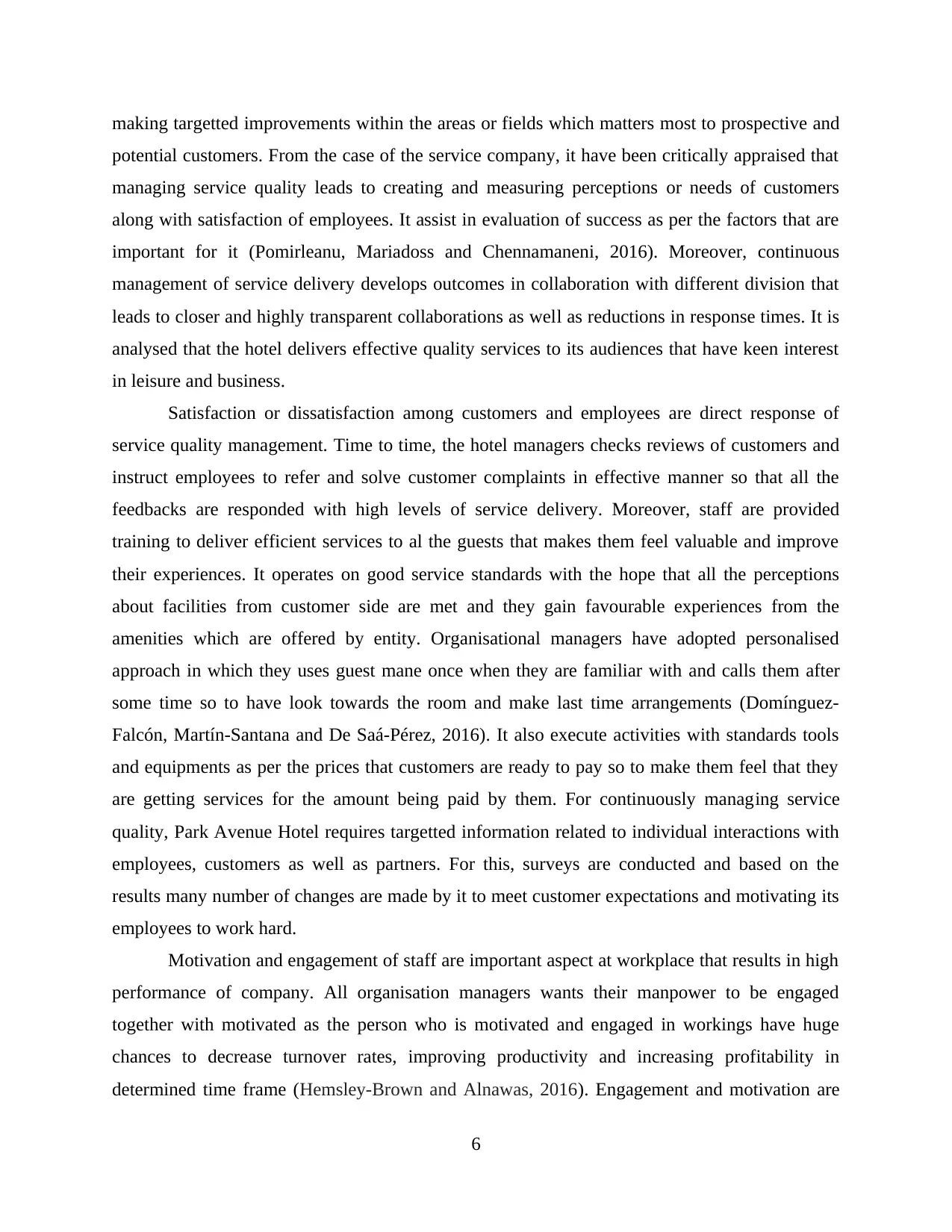
making targetted improvements within the areas or fields which matters most to prospective and
potential customers. From the case of the service company, it have been critically appraised that
managing service quality leads to creating and measuring perceptions or needs of customers
along with satisfaction of employees. It assist in evaluation of success as per the factors that are
important for it (Pomirleanu, Mariadoss and Chennamaneni, 2016). Moreover, continuous
management of service delivery develops outcomes in collaboration with different division that
leads to closer and highly transparent collaborations as well as reductions in response times. It is
analysed that the hotel delivers effective quality services to its audiences that have keen interest
in leisure and business.
Satisfaction or dissatisfaction among customers and employees are direct response of
service quality management. Time to time, the hotel managers checks reviews of customers and
instruct employees to refer and solve customer complaints in effective manner so that all the
feedbacks are responded with high levels of service delivery. Moreover, staff are provided
training to deliver efficient services to al the guests that makes them feel valuable and improve
their experiences. It operates on good service standards with the hope that all the perceptions
about facilities from customer side are met and they gain favourable experiences from the
amenities which are offered by entity. Organisational managers have adopted personalised
approach in which they uses guest mane once when they are familiar with and calls them after
some time so to have look towards the room and make last time arrangements (Domínguez-
Falcón, Martín-Santana and De Saá-Pérez, 2016). It also execute activities with standards tools
and equipments as per the prices that customers are ready to pay so to make them feel that they
are getting services for the amount being paid by them. For continuously managing service
quality, Park Avenue Hotel requires targetted information related to individual interactions with
employees, customers as well as partners. For this, surveys are conducted and based on the
results many number of changes are made by it to meet customer expectations and motivating its
employees to work hard.
Motivation and engagement of staff are important aspect at workplace that results in high
performance of company. All organisation managers wants their manpower to be engaged
together with motivated as the person who is motivated and engaged in workings have huge
chances to decrease turnover rates, improving productivity and increasing profitability in
determined time frame (Hemsley-Brown and Alnawas, 2016). Engagement and motivation are
6
potential customers. From the case of the service company, it have been critically appraised that
managing service quality leads to creating and measuring perceptions or needs of customers
along with satisfaction of employees. It assist in evaluation of success as per the factors that are
important for it (Pomirleanu, Mariadoss and Chennamaneni, 2016). Moreover, continuous
management of service delivery develops outcomes in collaboration with different division that
leads to closer and highly transparent collaborations as well as reductions in response times. It is
analysed that the hotel delivers effective quality services to its audiences that have keen interest
in leisure and business.
Satisfaction or dissatisfaction among customers and employees are direct response of
service quality management. Time to time, the hotel managers checks reviews of customers and
instruct employees to refer and solve customer complaints in effective manner so that all the
feedbacks are responded with high levels of service delivery. Moreover, staff are provided
training to deliver efficient services to al the guests that makes them feel valuable and improve
their experiences. It operates on good service standards with the hope that all the perceptions
about facilities from customer side are met and they gain favourable experiences from the
amenities which are offered by entity. Organisational managers have adopted personalised
approach in which they uses guest mane once when they are familiar with and calls them after
some time so to have look towards the room and make last time arrangements (Domínguez-
Falcón, Martín-Santana and De Saá-Pérez, 2016). It also execute activities with standards tools
and equipments as per the prices that customers are ready to pay so to make them feel that they
are getting services for the amount being paid by them. For continuously managing service
quality, Park Avenue Hotel requires targetted information related to individual interactions with
employees, customers as well as partners. For this, surveys are conducted and based on the
results many number of changes are made by it to meet customer expectations and motivating its
employees to work hard.
Motivation and engagement of staff are important aspect at workplace that results in high
performance of company. All organisation managers wants their manpower to be engaged
together with motivated as the person who is motivated and engaged in workings have huge
chances to decrease turnover rates, improving productivity and increasing profitability in
determined time frame (Hemsley-Brown and Alnawas, 2016). Engagement and motivation are
6
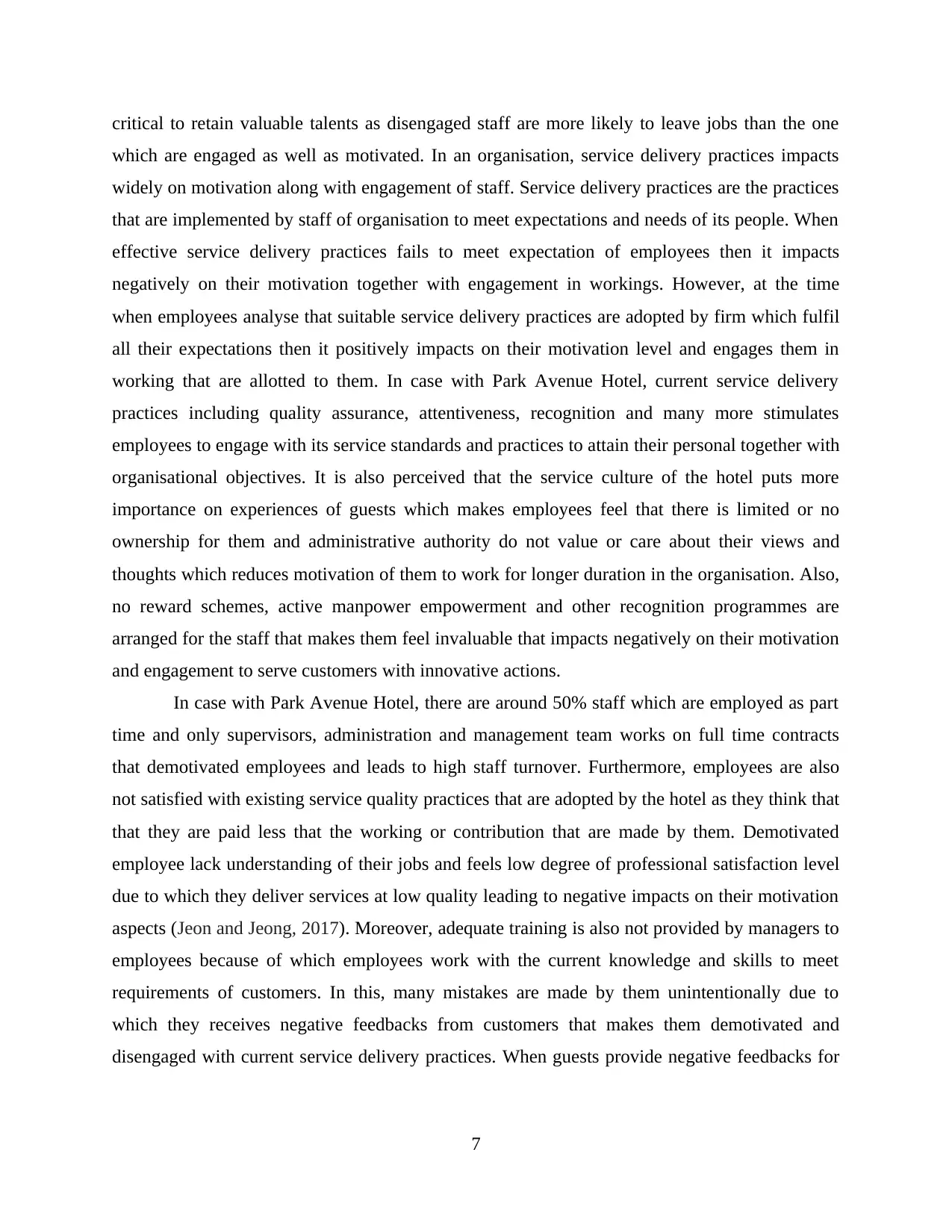
critical to retain valuable talents as disengaged staff are more likely to leave jobs than the one
which are engaged as well as motivated. In an organisation, service delivery practices impacts
widely on motivation along with engagement of staff. Service delivery practices are the practices
that are implemented by staff of organisation to meet expectations and needs of its people. When
effective service delivery practices fails to meet expectation of employees then it impacts
negatively on their motivation together with engagement in workings. However, at the time
when employees analyse that suitable service delivery practices are adopted by firm which fulfil
all their expectations then it positively impacts on their motivation level and engages them in
working that are allotted to them. In case with Park Avenue Hotel, current service delivery
practices including quality assurance, attentiveness, recognition and many more stimulates
employees to engage with its service standards and practices to attain their personal together with
organisational objectives. It is also perceived that the service culture of the hotel puts more
importance on experiences of guests which makes employees feel that there is limited or no
ownership for them and administrative authority do not value or care about their views and
thoughts which reduces motivation of them to work for longer duration in the organisation. Also,
no reward schemes, active manpower empowerment and other recognition programmes are
arranged for the staff that makes them feel invaluable that impacts negatively on their motivation
and engagement to serve customers with innovative actions.
In case with Park Avenue Hotel, there are around 50% staff which are employed as part
time and only supervisors, administration and management team works on full time contracts
that demotivated employees and leads to high staff turnover. Furthermore, employees are also
not satisfied with existing service quality practices that are adopted by the hotel as they think that
that they are paid less that the working or contribution that are made by them. Demotivated
employee lack understanding of their jobs and feels low degree of professional satisfaction level
due to which they deliver services at low quality leading to negative impacts on their motivation
aspects (Jeon and Jeong, 2017). Moreover, adequate training is also not provided by managers to
employees because of which employees work with the current knowledge and skills to meet
requirements of customers. In this, many mistakes are made by them unintentionally due to
which they receives negative feedbacks from customers that makes them demotivated and
disengaged with current service delivery practices. When guests provide negative feedbacks for
7
which are engaged as well as motivated. In an organisation, service delivery practices impacts
widely on motivation along with engagement of staff. Service delivery practices are the practices
that are implemented by staff of organisation to meet expectations and needs of its people. When
effective service delivery practices fails to meet expectation of employees then it impacts
negatively on their motivation together with engagement in workings. However, at the time
when employees analyse that suitable service delivery practices are adopted by firm which fulfil
all their expectations then it positively impacts on their motivation level and engages them in
working that are allotted to them. In case with Park Avenue Hotel, current service delivery
practices including quality assurance, attentiveness, recognition and many more stimulates
employees to engage with its service standards and practices to attain their personal together with
organisational objectives. It is also perceived that the service culture of the hotel puts more
importance on experiences of guests which makes employees feel that there is limited or no
ownership for them and administrative authority do not value or care about their views and
thoughts which reduces motivation of them to work for longer duration in the organisation. Also,
no reward schemes, active manpower empowerment and other recognition programmes are
arranged for the staff that makes them feel invaluable that impacts negatively on their motivation
and engagement to serve customers with innovative actions.
In case with Park Avenue Hotel, there are around 50% staff which are employed as part
time and only supervisors, administration and management team works on full time contracts
that demotivated employees and leads to high staff turnover. Furthermore, employees are also
not satisfied with existing service quality practices that are adopted by the hotel as they think that
that they are paid less that the working or contribution that are made by them. Demotivated
employee lack understanding of their jobs and feels low degree of professional satisfaction level
due to which they deliver services at low quality leading to negative impacts on their motivation
aspects (Jeon and Jeong, 2017). Moreover, adequate training is also not provided by managers to
employees because of which employees work with the current knowledge and skills to meet
requirements of customers. In this, many mistakes are made by them unintentionally due to
which they receives negative feedbacks from customers that makes them demotivated and
disengaged with current service delivery practices. When guests provide negative feedbacks for
7
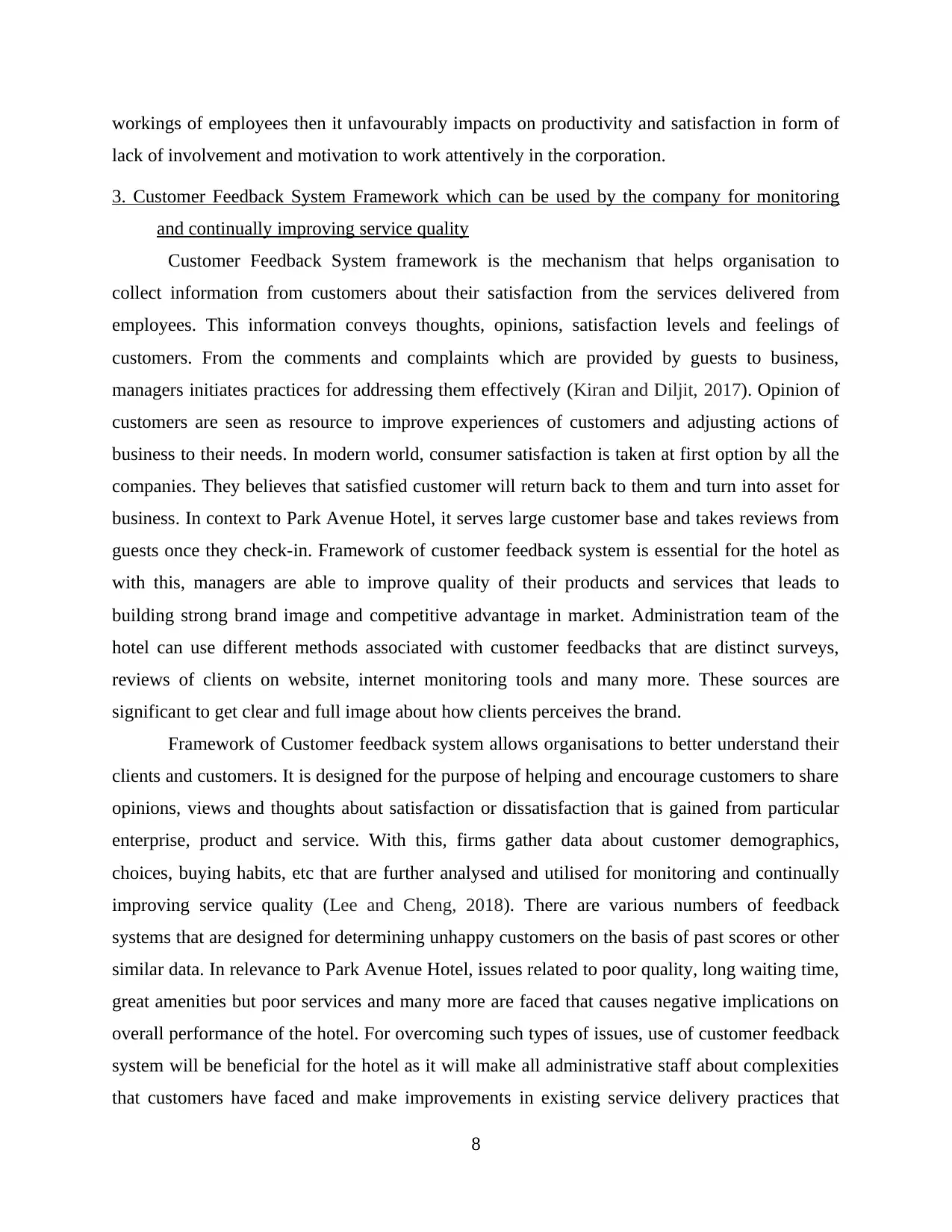
workings of employees then it unfavourably impacts on productivity and satisfaction in form of
lack of involvement and motivation to work attentively in the corporation.
3. Customer Feedback System Framework which can be used by the company for monitoring
and continually improving service quality
Customer Feedback System framework is the mechanism that helps organisation to
collect information from customers about their satisfaction from the services delivered from
employees. This information conveys thoughts, opinions, satisfaction levels and feelings of
customers. From the comments and complaints which are provided by guests to business,
managers initiates practices for addressing them effectively (Kiran and Diljit, 2017). Opinion of
customers are seen as resource to improve experiences of customers and adjusting actions of
business to their needs. In modern world, consumer satisfaction is taken at first option by all the
companies. They believes that satisfied customer will return back to them and turn into asset for
business. In context to Park Avenue Hotel, it serves large customer base and takes reviews from
guests once they check-in. Framework of customer feedback system is essential for the hotel as
with this, managers are able to improve quality of their products and services that leads to
building strong brand image and competitive advantage in market. Administration team of the
hotel can use different methods associated with customer feedbacks that are distinct surveys,
reviews of clients on website, internet monitoring tools and many more. These sources are
significant to get clear and full image about how clients perceives the brand.
Framework of Customer feedback system allows organisations to better understand their
clients and customers. It is designed for the purpose of helping and encourage customers to share
opinions, views and thoughts about satisfaction or dissatisfaction that is gained from particular
enterprise, product and service. With this, firms gather data about customer demographics,
choices, buying habits, etc that are further analysed and utilised for monitoring and continually
improving service quality (Lee and Cheng, 2018). There are various numbers of feedback
systems that are designed for determining unhappy customers on the basis of past scores or other
similar data. In relevance to Park Avenue Hotel, issues related to poor quality, long waiting time,
great amenities but poor services and many more are faced that causes negative implications on
overall performance of the hotel. For overcoming such types of issues, use of customer feedback
system will be beneficial for the hotel as it will make all administrative staff about complexities
that customers have faced and make improvements in existing service delivery practices that
8
lack of involvement and motivation to work attentively in the corporation.
3. Customer Feedback System Framework which can be used by the company for monitoring
and continually improving service quality
Customer Feedback System framework is the mechanism that helps organisation to
collect information from customers about their satisfaction from the services delivered from
employees. This information conveys thoughts, opinions, satisfaction levels and feelings of
customers. From the comments and complaints which are provided by guests to business,
managers initiates practices for addressing them effectively (Kiran and Diljit, 2017). Opinion of
customers are seen as resource to improve experiences of customers and adjusting actions of
business to their needs. In modern world, consumer satisfaction is taken at first option by all the
companies. They believes that satisfied customer will return back to them and turn into asset for
business. In context to Park Avenue Hotel, it serves large customer base and takes reviews from
guests once they check-in. Framework of customer feedback system is essential for the hotel as
with this, managers are able to improve quality of their products and services that leads to
building strong brand image and competitive advantage in market. Administration team of the
hotel can use different methods associated with customer feedbacks that are distinct surveys,
reviews of clients on website, internet monitoring tools and many more. These sources are
significant to get clear and full image about how clients perceives the brand.
Framework of Customer feedback system allows organisations to better understand their
clients and customers. It is designed for the purpose of helping and encourage customers to share
opinions, views and thoughts about satisfaction or dissatisfaction that is gained from particular
enterprise, product and service. With this, firms gather data about customer demographics,
choices, buying habits, etc that are further analysed and utilised for monitoring and continually
improving service quality (Lee and Cheng, 2018). There are various numbers of feedback
systems that are designed for determining unhappy customers on the basis of past scores or other
similar data. In relevance to Park Avenue Hotel, issues related to poor quality, long waiting time,
great amenities but poor services and many more are faced that causes negative implications on
overall performance of the hotel. For overcoming such types of issues, use of customer feedback
system will be beneficial for the hotel as it will make all administrative staff about complexities
that customers have faced and make improvements in existing service delivery practices that
8
Secure Best Marks with AI Grader
Need help grading? Try our AI Grader for instant feedback on your assignments.
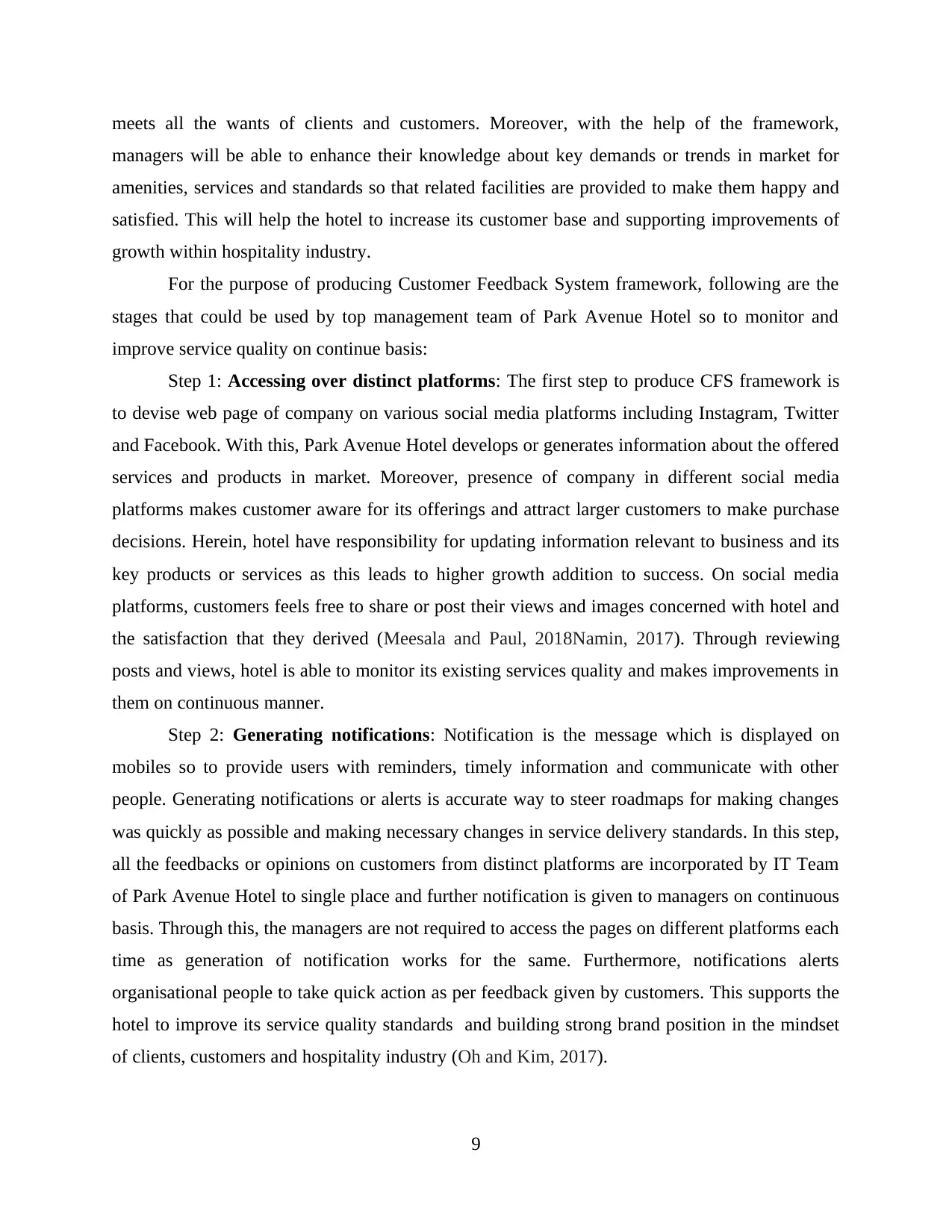
meets all the wants of clients and customers. Moreover, with the help of the framework,
managers will be able to enhance their knowledge about key demands or trends in market for
amenities, services and standards so that related facilities are provided to make them happy and
satisfied. This will help the hotel to increase its customer base and supporting improvements of
growth within hospitality industry.
For the purpose of producing Customer Feedback System framework, following are the
stages that could be used by top management team of Park Avenue Hotel so to monitor and
improve service quality on continue basis:
Step 1: Accessing over distinct platforms: The first step to produce CFS framework is
to devise web page of company on various social media platforms including Instagram, Twitter
and Facebook. With this, Park Avenue Hotel develops or generates information about the offered
services and products in market. Moreover, presence of company in different social media
platforms makes customer aware for its offerings and attract larger customers to make purchase
decisions. Herein, hotel have responsibility for updating information relevant to business and its
key products or services as this leads to higher growth addition to success. On social media
platforms, customers feels free to share or post their views and images concerned with hotel and
the satisfaction that they derived (Meesala and Paul, 2018Namin, 2017). Through reviewing
posts and views, hotel is able to monitor its existing services quality and makes improvements in
them on continuous manner.
Step 2: Generating notifications: Notification is the message which is displayed on
mobiles so to provide users with reminders, timely information and communicate with other
people. Generating notifications or alerts is accurate way to steer roadmaps for making changes
was quickly as possible and making necessary changes in service delivery standards. In this step,
all the feedbacks or opinions on customers from distinct platforms are incorporated by IT Team
of Park Avenue Hotel to single place and further notification is given to managers on continuous
basis. Through this, the managers are not required to access the pages on different platforms each
time as generation of notification works for the same. Furthermore, notifications alerts
organisational people to take quick action as per feedback given by customers. This supports the
hotel to improve its service quality standards and building strong brand position in the mindset
of clients, customers and hospitality industry (Oh and Kim, 2017).
9
managers will be able to enhance their knowledge about key demands or trends in market for
amenities, services and standards so that related facilities are provided to make them happy and
satisfied. This will help the hotel to increase its customer base and supporting improvements of
growth within hospitality industry.
For the purpose of producing Customer Feedback System framework, following are the
stages that could be used by top management team of Park Avenue Hotel so to monitor and
improve service quality on continue basis:
Step 1: Accessing over distinct platforms: The first step to produce CFS framework is
to devise web page of company on various social media platforms including Instagram, Twitter
and Facebook. With this, Park Avenue Hotel develops or generates information about the offered
services and products in market. Moreover, presence of company in different social media
platforms makes customer aware for its offerings and attract larger customers to make purchase
decisions. Herein, hotel have responsibility for updating information relevant to business and its
key products or services as this leads to higher growth addition to success. On social media
platforms, customers feels free to share or post their views and images concerned with hotel and
the satisfaction that they derived (Meesala and Paul, 2018Namin, 2017). Through reviewing
posts and views, hotel is able to monitor its existing services quality and makes improvements in
them on continuous manner.
Step 2: Generating notifications: Notification is the message which is displayed on
mobiles so to provide users with reminders, timely information and communicate with other
people. Generating notifications or alerts is accurate way to steer roadmaps for making changes
was quickly as possible and making necessary changes in service delivery standards. In this step,
all the feedbacks or opinions on customers from distinct platforms are incorporated by IT Team
of Park Avenue Hotel to single place and further notification is given to managers on continuous
basis. Through this, the managers are not required to access the pages on different platforms each
time as generation of notification works for the same. Furthermore, notifications alerts
organisational people to take quick action as per feedback given by customers. This supports the
hotel to improve its service quality standards and building strong brand position in the mindset
of clients, customers and hospitality industry (Oh and Kim, 2017).
9
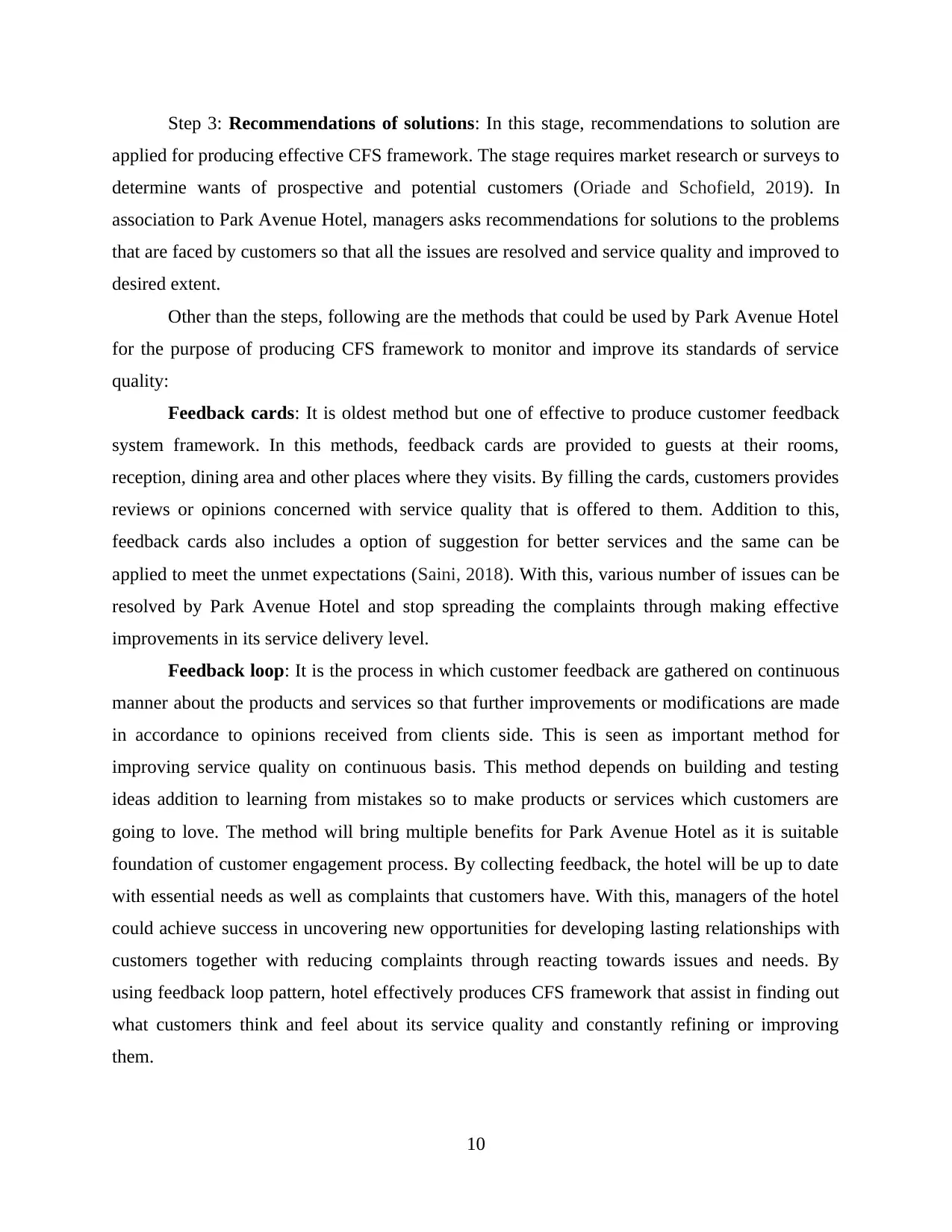
Step 3: Recommendations of solutions: In this stage, recommendations to solution are
applied for producing effective CFS framework. The stage requires market research or surveys to
determine wants of prospective and potential customers (Oriade and Schofield, 2019). In
association to Park Avenue Hotel, managers asks recommendations for solutions to the problems
that are faced by customers so that all the issues are resolved and service quality and improved to
desired extent.
Other than the steps, following are the methods that could be used by Park Avenue Hotel
for the purpose of producing CFS framework to monitor and improve its standards of service
quality:
Feedback cards: It is oldest method but one of effective to produce customer feedback
system framework. In this methods, feedback cards are provided to guests at their rooms,
reception, dining area and other places where they visits. By filling the cards, customers provides
reviews or opinions concerned with service quality that is offered to them. Addition to this,
feedback cards also includes a option of suggestion for better services and the same can be
applied to meet the unmet expectations (Saini, 2018). With this, various number of issues can be
resolved by Park Avenue Hotel and stop spreading the complaints through making effective
improvements in its service delivery level.
Feedback loop: It is the process in which customer feedback are gathered on continuous
manner about the products and services so that further improvements or modifications are made
in accordance to opinions received from clients side. This is seen as important method for
improving service quality on continuous basis. This method depends on building and testing
ideas addition to learning from mistakes so to make products or services which customers are
going to love. The method will bring multiple benefits for Park Avenue Hotel as it is suitable
foundation of customer engagement process. By collecting feedback, the hotel will be up to date
with essential needs as well as complaints that customers have. With this, managers of the hotel
could achieve success in uncovering new opportunities for developing lasting relationships with
customers together with reducing complaints through reacting towards issues and needs. By
using feedback loop pattern, hotel effectively produces CFS framework that assist in finding out
what customers think and feel about its service quality and constantly refining or improving
them.
10
applied for producing effective CFS framework. The stage requires market research or surveys to
determine wants of prospective and potential customers (Oriade and Schofield, 2019). In
association to Park Avenue Hotel, managers asks recommendations for solutions to the problems
that are faced by customers so that all the issues are resolved and service quality and improved to
desired extent.
Other than the steps, following are the methods that could be used by Park Avenue Hotel
for the purpose of producing CFS framework to monitor and improve its standards of service
quality:
Feedback cards: It is oldest method but one of effective to produce customer feedback
system framework. In this methods, feedback cards are provided to guests at their rooms,
reception, dining area and other places where they visits. By filling the cards, customers provides
reviews or opinions concerned with service quality that is offered to them. Addition to this,
feedback cards also includes a option of suggestion for better services and the same can be
applied to meet the unmet expectations (Saini, 2018). With this, various number of issues can be
resolved by Park Avenue Hotel and stop spreading the complaints through making effective
improvements in its service delivery level.
Feedback loop: It is the process in which customer feedback are gathered on continuous
manner about the products and services so that further improvements or modifications are made
in accordance to opinions received from clients side. This is seen as important method for
improving service quality on continuous basis. This method depends on building and testing
ideas addition to learning from mistakes so to make products or services which customers are
going to love. The method will bring multiple benefits for Park Avenue Hotel as it is suitable
foundation of customer engagement process. By collecting feedback, the hotel will be up to date
with essential needs as well as complaints that customers have. With this, managers of the hotel
could achieve success in uncovering new opportunities for developing lasting relationships with
customers together with reducing complaints through reacting towards issues and needs. By
using feedback loop pattern, hotel effectively produces CFS framework that assist in finding out
what customers think and feel about its service quality and constantly refining or improving
them.
10
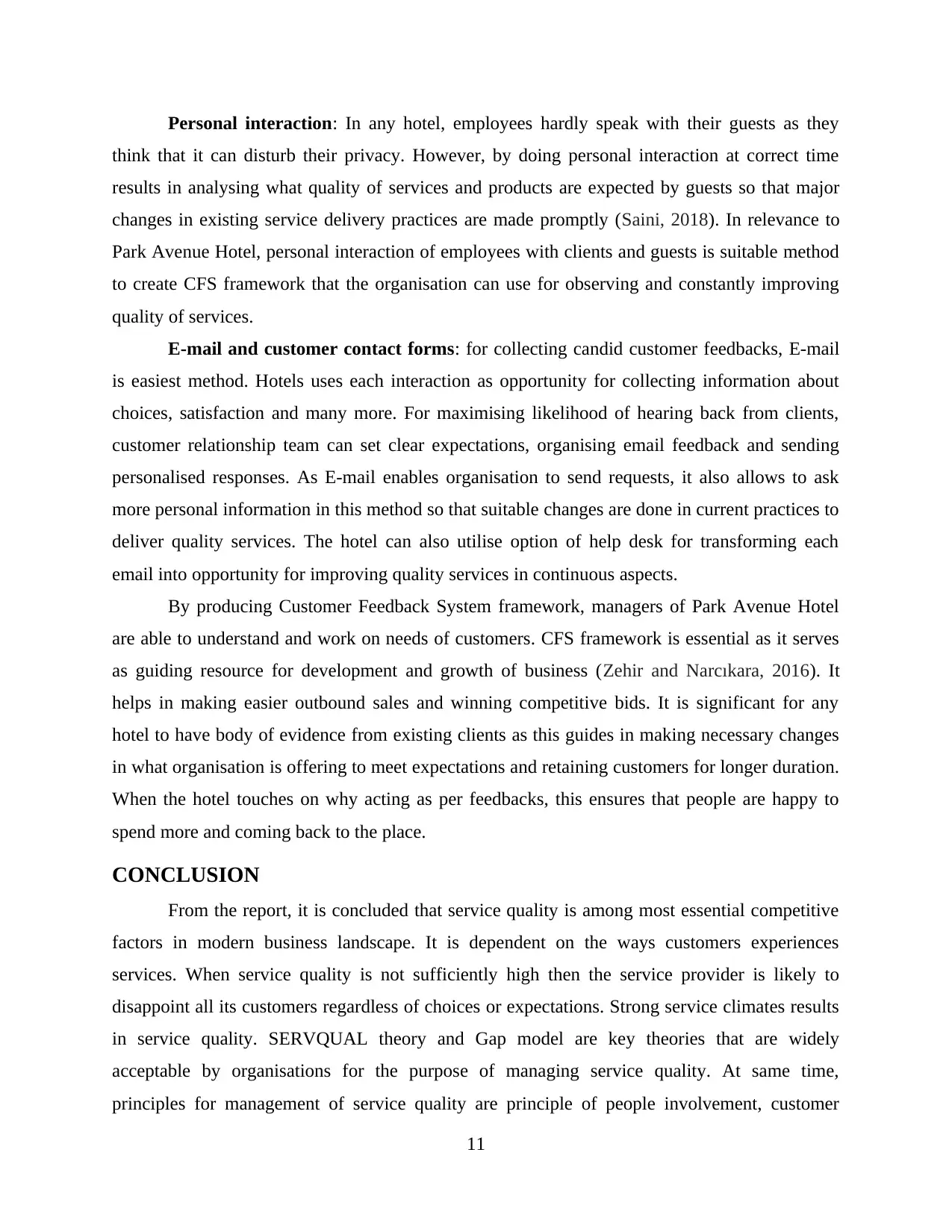
Personal interaction: In any hotel, employees hardly speak with their guests as they
think that it can disturb their privacy. However, by doing personal interaction at correct time
results in analysing what quality of services and products are expected by guests so that major
changes in existing service delivery practices are made promptly (Saini, 2018). In relevance to
Park Avenue Hotel, personal interaction of employees with clients and guests is suitable method
to create CFS framework that the organisation can use for observing and constantly improving
quality of services.
E-mail and customer contact forms: for collecting candid customer feedbacks, E-mail
is easiest method. Hotels uses each interaction as opportunity for collecting information about
choices, satisfaction and many more. For maximising likelihood of hearing back from clients,
customer relationship team can set clear expectations, organising email feedback and sending
personalised responses. As E-mail enables organisation to send requests, it also allows to ask
more personal information in this method so that suitable changes are done in current practices to
deliver quality services. The hotel can also utilise option of help desk for transforming each
email into opportunity for improving quality services in continuous aspects.
By producing Customer Feedback System framework, managers of Park Avenue Hotel
are able to understand and work on needs of customers. CFS framework is essential as it serves
as guiding resource for development and growth of business (Zehir and Narcıkara, 2016). It
helps in making easier outbound sales and winning competitive bids. It is significant for any
hotel to have body of evidence from existing clients as this guides in making necessary changes
in what organisation is offering to meet expectations and retaining customers for longer duration.
When the hotel touches on why acting as per feedbacks, this ensures that people are happy to
spend more and coming back to the place.
CONCLUSION
From the report, it is concluded that service quality is among most essential competitive
factors in modern business landscape. It is dependent on the ways customers experiences
services. When service quality is not sufficiently high then the service provider is likely to
disappoint all its customers regardless of choices or expectations. Strong service climates results
in service quality. SERVQUAL theory and Gap model are key theories that are widely
acceptable by organisations for the purpose of managing service quality. At same time,
principles for management of service quality are principle of people involvement, customer
11
think that it can disturb their privacy. However, by doing personal interaction at correct time
results in analysing what quality of services and products are expected by guests so that major
changes in existing service delivery practices are made promptly (Saini, 2018). In relevance to
Park Avenue Hotel, personal interaction of employees with clients and guests is suitable method
to create CFS framework that the organisation can use for observing and constantly improving
quality of services.
E-mail and customer contact forms: for collecting candid customer feedbacks, E-mail
is easiest method. Hotels uses each interaction as opportunity for collecting information about
choices, satisfaction and many more. For maximising likelihood of hearing back from clients,
customer relationship team can set clear expectations, organising email feedback and sending
personalised responses. As E-mail enables organisation to send requests, it also allows to ask
more personal information in this method so that suitable changes are done in current practices to
deliver quality services. The hotel can also utilise option of help desk for transforming each
email into opportunity for improving quality services in continuous aspects.
By producing Customer Feedback System framework, managers of Park Avenue Hotel
are able to understand and work on needs of customers. CFS framework is essential as it serves
as guiding resource for development and growth of business (Zehir and Narcıkara, 2016). It
helps in making easier outbound sales and winning competitive bids. It is significant for any
hotel to have body of evidence from existing clients as this guides in making necessary changes
in what organisation is offering to meet expectations and retaining customers for longer duration.
When the hotel touches on why acting as per feedbacks, this ensures that people are happy to
spend more and coming back to the place.
CONCLUSION
From the report, it is concluded that service quality is among most essential competitive
factors in modern business landscape. It is dependent on the ways customers experiences
services. When service quality is not sufficiently high then the service provider is likely to
disappoint all its customers regardless of choices or expectations. Strong service climates results
in service quality. SERVQUAL theory and Gap model are key theories that are widely
acceptable by organisations for the purpose of managing service quality. At same time,
principles for management of service quality are principle of people involvement, customer
11
Paraphrase This Document
Need a fresh take? Get an instant paraphrase of this document with our AI Paraphraser
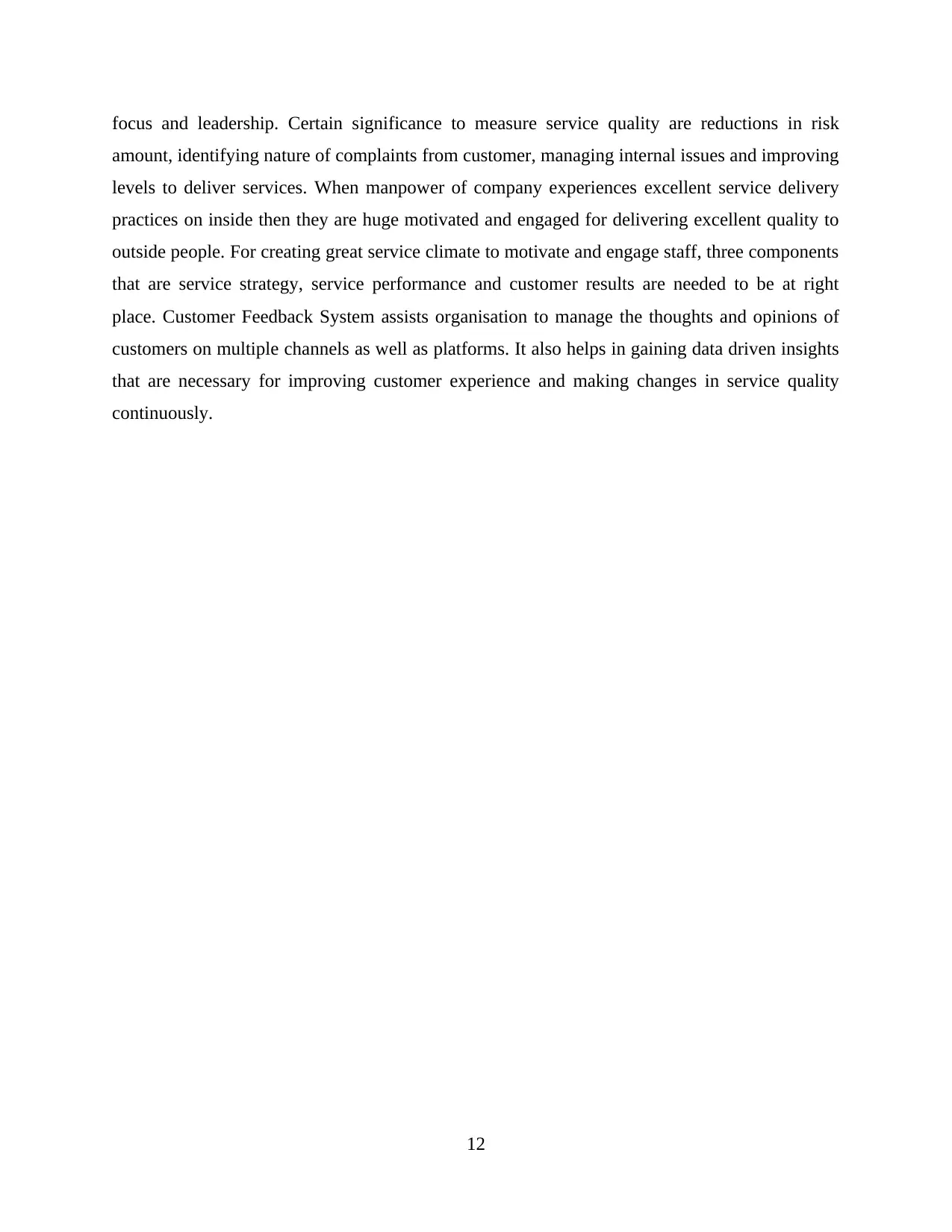
focus and leadership. Certain significance to measure service quality are reductions in risk
amount, identifying nature of complaints from customer, managing internal issues and improving
levels to deliver services. When manpower of company experiences excellent service delivery
practices on inside then they are huge motivated and engaged for delivering excellent quality to
outside people. For creating great service climate to motivate and engage staff, three components
that are service strategy, service performance and customer results are needed to be at right
place. Customer Feedback System assists organisation to manage the thoughts and opinions of
customers on multiple channels as well as platforms. It also helps in gaining data driven insights
that are necessary for improving customer experience and making changes in service quality
continuously.
12
amount, identifying nature of complaints from customer, managing internal issues and improving
levels to deliver services. When manpower of company experiences excellent service delivery
practices on inside then they are huge motivated and engaged for delivering excellent quality to
outside people. For creating great service climate to motivate and engage staff, three components
that are service strategy, service performance and customer results are needed to be at right
place. Customer Feedback System assists organisation to manage the thoughts and opinions of
customers on multiple channels as well as platforms. It also helps in gaining data driven insights
that are necessary for improving customer experience and making changes in service quality
continuously.
12
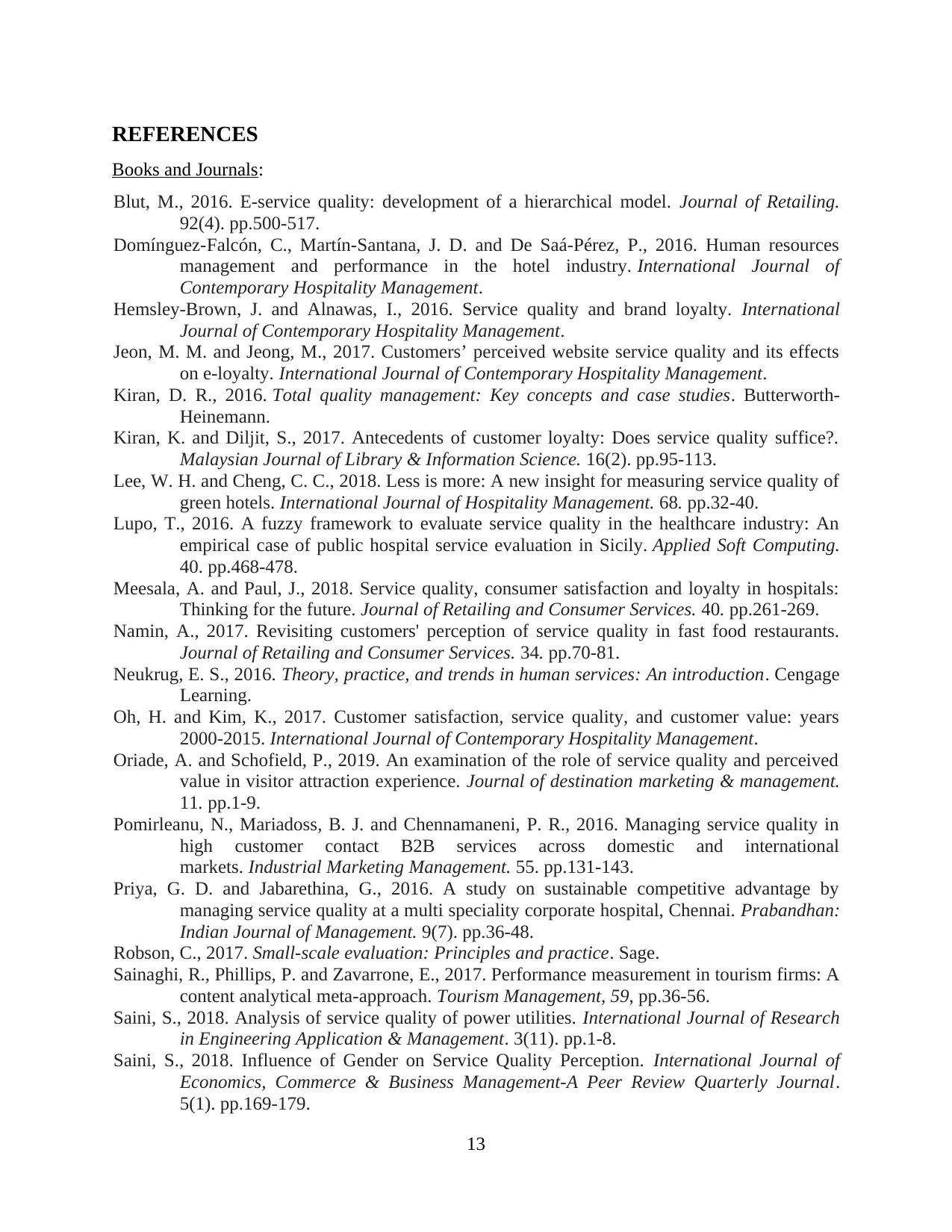
REFERENCES
Books and Journals:
Blut, M., 2016. E-service quality: development of a hierarchical model. Journal of Retailing.
92(4). pp.500-517.
Domínguez-Falcón, C., Martín-Santana, J. D. and De Saá-Pérez, P., 2016. Human resources
management and performance in the hotel industry. International Journal of
Contemporary Hospitality Management.
Hemsley-Brown, J. and Alnawas, I., 2016. Service quality and brand loyalty. International
Journal of Contemporary Hospitality Management.
Jeon, M. M. and Jeong, M., 2017. Customers’ perceived website service quality and its effects
on e-loyalty. International Journal of Contemporary Hospitality Management.
Kiran, D. R., 2016. Total quality management: Key concepts and case studies. Butterworth-
Heinemann.
Kiran, K. and Diljit, S., 2017. Antecedents of customer loyalty: Does service quality suffice?.
Malaysian Journal of Library & Information Science. 16(2). pp.95-113.
Lee, W. H. and Cheng, C. C., 2018. Less is more: A new insight for measuring service quality of
green hotels. International Journal of Hospitality Management. 68. pp.32-40.
Lupo, T., 2016. A fuzzy framework to evaluate service quality in the healthcare industry: An
empirical case of public hospital service evaluation in Sicily. Applied Soft Computing.
40. pp.468-478.
Meesala, A. and Paul, J., 2018. Service quality, consumer satisfaction and loyalty in hospitals:
Thinking for the future. Journal of Retailing and Consumer Services. 40. pp.261-269.
Namin, A., 2017. Revisiting customers' perception of service quality in fast food restaurants.
Journal of Retailing and Consumer Services. 34. pp.70-81.
Neukrug, E. S., 2016. Theory, practice, and trends in human services: An introduction. Cengage
Learning.
Oh, H. and Kim, K., 2017. Customer satisfaction, service quality, and customer value: years
2000-2015. International Journal of Contemporary Hospitality Management.
Oriade, A. and Schofield, P., 2019. An examination of the role of service quality and perceived
value in visitor attraction experience. Journal of destination marketing & management.
11. pp.1-9.
Pomirleanu, N., Mariadoss, B. J. and Chennamaneni, P. R., 2016. Managing service quality in
high customer contact B2B services across domestic and international
markets. Industrial Marketing Management. 55. pp.131-143.
Priya, G. D. and Jabarethina, G., 2016. A study on sustainable competitive advantage by
managing service quality at a multi speciality corporate hospital, Chennai. Prabandhan:
Indian Journal of Management. 9(7). pp.36-48.
Robson, C., 2017. Small-scale evaluation: Principles and practice. Sage.
Sainaghi, R., Phillips, P. and Zavarrone, E., 2017. Performance measurement in tourism firms: A
content analytical meta-approach. Tourism Management, 59, pp.36-56.
Saini, S., 2018. Analysis of service quality of power utilities. International Journal of Research
in Engineering Application & Management. 3(11). pp.1-8.
Saini, S., 2018. Influence of Gender on Service Quality Perception. International Journal of
Economics, Commerce & Business Management-A Peer Review Quarterly Journal.
5(1). pp.169-179.
13
Books and Journals:
Blut, M., 2016. E-service quality: development of a hierarchical model. Journal of Retailing.
92(4). pp.500-517.
Domínguez-Falcón, C., Martín-Santana, J. D. and De Saá-Pérez, P., 2016. Human resources
management and performance in the hotel industry. International Journal of
Contemporary Hospitality Management.
Hemsley-Brown, J. and Alnawas, I., 2016. Service quality and brand loyalty. International
Journal of Contemporary Hospitality Management.
Jeon, M. M. and Jeong, M., 2017. Customers’ perceived website service quality and its effects
on e-loyalty. International Journal of Contemporary Hospitality Management.
Kiran, D. R., 2016. Total quality management: Key concepts and case studies. Butterworth-
Heinemann.
Kiran, K. and Diljit, S., 2017. Antecedents of customer loyalty: Does service quality suffice?.
Malaysian Journal of Library & Information Science. 16(2). pp.95-113.
Lee, W. H. and Cheng, C. C., 2018. Less is more: A new insight for measuring service quality of
green hotels. International Journal of Hospitality Management. 68. pp.32-40.
Lupo, T., 2016. A fuzzy framework to evaluate service quality in the healthcare industry: An
empirical case of public hospital service evaluation in Sicily. Applied Soft Computing.
40. pp.468-478.
Meesala, A. and Paul, J., 2018. Service quality, consumer satisfaction and loyalty in hospitals:
Thinking for the future. Journal of Retailing and Consumer Services. 40. pp.261-269.
Namin, A., 2017. Revisiting customers' perception of service quality in fast food restaurants.
Journal of Retailing and Consumer Services. 34. pp.70-81.
Neukrug, E. S., 2016. Theory, practice, and trends in human services: An introduction. Cengage
Learning.
Oh, H. and Kim, K., 2017. Customer satisfaction, service quality, and customer value: years
2000-2015. International Journal of Contemporary Hospitality Management.
Oriade, A. and Schofield, P., 2019. An examination of the role of service quality and perceived
value in visitor attraction experience. Journal of destination marketing & management.
11. pp.1-9.
Pomirleanu, N., Mariadoss, B. J. and Chennamaneni, P. R., 2016. Managing service quality in
high customer contact B2B services across domestic and international
markets. Industrial Marketing Management. 55. pp.131-143.
Priya, G. D. and Jabarethina, G., 2016. A study on sustainable competitive advantage by
managing service quality at a multi speciality corporate hospital, Chennai. Prabandhan:
Indian Journal of Management. 9(7). pp.36-48.
Robson, C., 2017. Small-scale evaluation: Principles and practice. Sage.
Sainaghi, R., Phillips, P. and Zavarrone, E., 2017. Performance measurement in tourism firms: A
content analytical meta-approach. Tourism Management, 59, pp.36-56.
Saini, S., 2018. Analysis of service quality of power utilities. International Journal of Research
in Engineering Application & Management. 3(11). pp.1-8.
Saini, S., 2018. Influence of Gender on Service Quality Perception. International Journal of
Economics, Commerce & Business Management-A Peer Review Quarterly Journal.
5(1). pp.169-179.
13
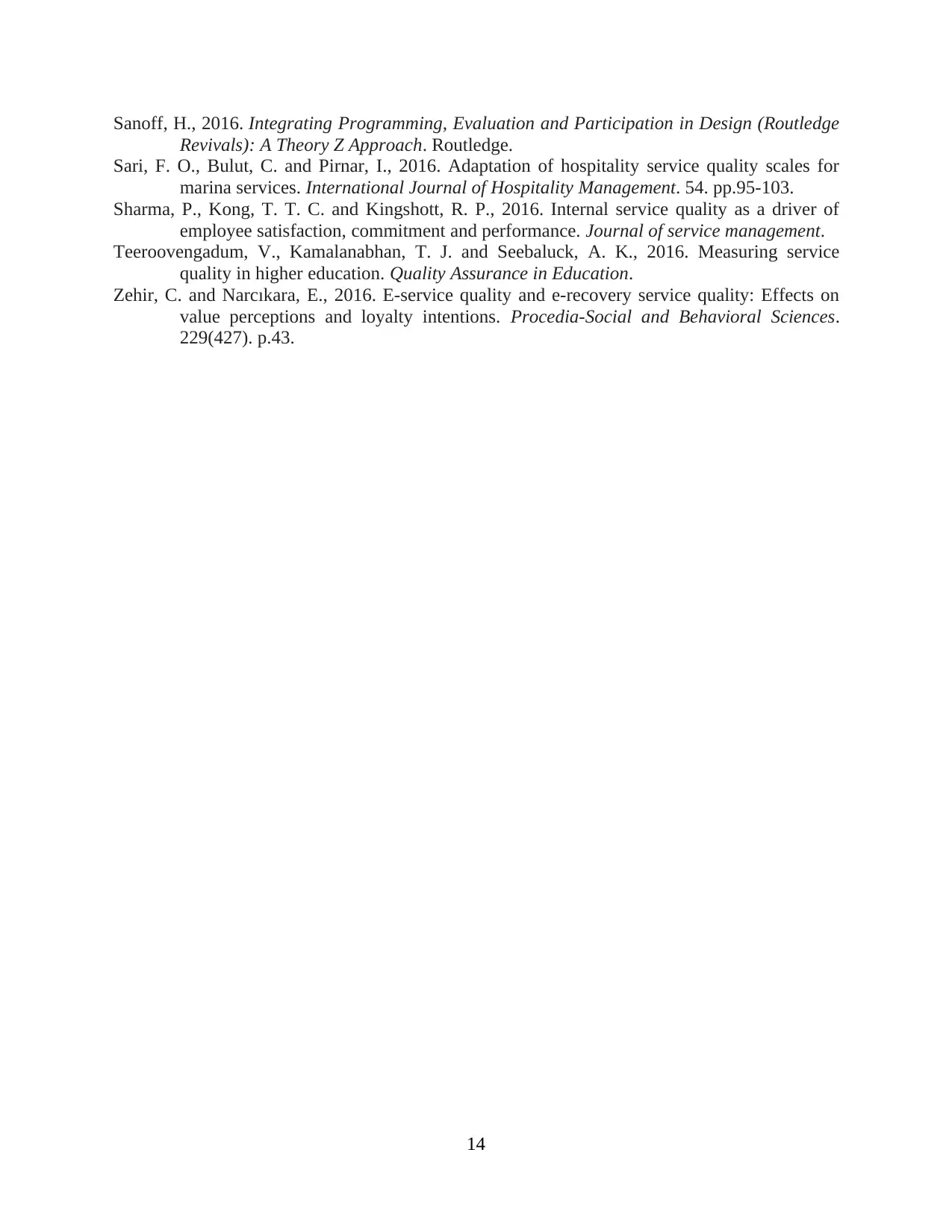
Sanoff, H., 2016. Integrating Programming, Evaluation and Participation in Design (Routledge
Revivals): A Theory Z Approach. Routledge.
Sari, F. O., Bulut, C. and Pirnar, I., 2016. Adaptation of hospitality service quality scales for
marina services. International Journal of Hospitality Management. 54. pp.95-103.
Sharma, P., Kong, T. T. C. and Kingshott, R. P., 2016. Internal service quality as a driver of
employee satisfaction, commitment and performance. Journal of service management.
Teeroovengadum, V., Kamalanabhan, T. J. and Seebaluck, A. K., 2016. Measuring service
quality in higher education. Quality Assurance in Education.
Zehir, C. and Narcıkara, E., 2016. E-service quality and e-recovery service quality: Effects on
value perceptions and loyalty intentions. Procedia-Social and Behavioral Sciences.
229(427). p.43.
14
Revivals): A Theory Z Approach. Routledge.
Sari, F. O., Bulut, C. and Pirnar, I., 2016. Adaptation of hospitality service quality scales for
marina services. International Journal of Hospitality Management. 54. pp.95-103.
Sharma, P., Kong, T. T. C. and Kingshott, R. P., 2016. Internal service quality as a driver of
employee satisfaction, commitment and performance. Journal of service management.
Teeroovengadum, V., Kamalanabhan, T. J. and Seebaluck, A. K., 2016. Measuring service
quality in higher education. Quality Assurance in Education.
Zehir, C. and Narcıkara, E., 2016. E-service quality and e-recovery service quality: Effects on
value perceptions and loyalty intentions. Procedia-Social and Behavioral Sciences.
229(427). p.43.
14
1 out of 16
Related Documents
Your All-in-One AI-Powered Toolkit for Academic Success.
+13062052269
info@desklib.com
Available 24*7 on WhatsApp / Email
![[object Object]](/_next/static/media/star-bottom.7253800d.svg)
Unlock your academic potential
© 2024 | Zucol Services PVT LTD | All rights reserved.





